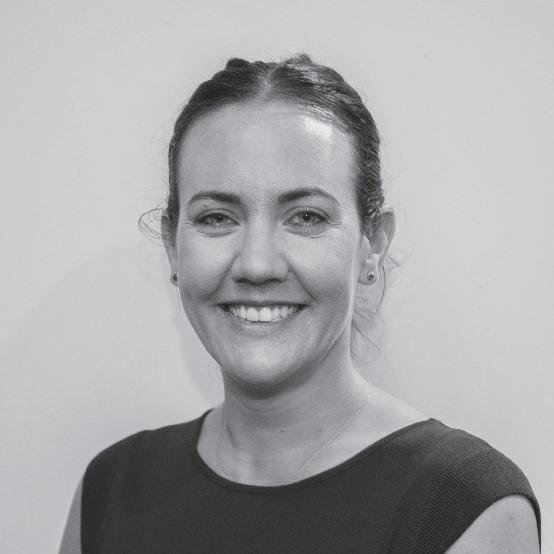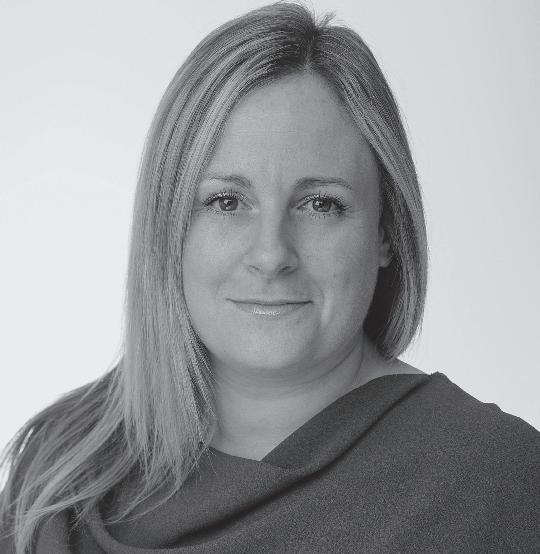LIST
Recognising spectacular client outcomes
+ Offering choice and certainty p24

THE SPECIALIST EFFECT
Partner with a specialist
When specialist knowledge, flexible lending and strong broker relationships combine, you get a special effect!




• Regulated & Non-regulated loans - up to 75% LTV
• Fast Track process
• Online self-service broker portal
• Biometric ID verification
• AVMs
• Dual Legal representation
ince the last issue of Bridging & Commercial, interest rates have been hiked up to 4%, UK house price growth has continued to dally, and the construction industry is staring recession in the face, according to the Construction Products Association’s winter forecasts. The report predicts that, this year, private housing output will take an 11% slump due to rising mortgage rates, falling real wages and meagre consumer confidence. However, with economists anticipating that inflation is close to peaking— and could start to fall this summer—and land values expected to drop as housebuilders focus on their existing projects rather than new sites, it’s not all doom and gloom for the property market.
If anything, this is the time the specialist finance space truly shines. As stated by the latest Bridging Trends report, bridging loan transactions surged to the highest they have been in three years. The need for rapid transactions was shown by the rise in bridging finance being used to prevent chain breaks.
In this issue, we devote a great deal of time talking to experts about how to navigate a tumultuous market [p24], spot opportunities [p58], and what can be learnt from it all [p64].
Additionally, we take a deep dive into training and increasing standards in the sector. In January, we ventured up to Middlesbrough to visit the female-led powerhouse behind VAS Valuation Group to discuss how they are raising the bar across the industry [p68]. We also chat to some of the authors of FIBA and ASTL’s new specialist finance qualification [p10]—an idea which has been floated by various associations and individuals for as long as I’ve been writing about bridging—and take a look at White Rose Finance Group’s new LIBF-accredited broker education scheme [p20].
‘Education’ and ‘service’ were the words on every lender’s lips at our annual Directors’ Lunch in January, where we welcomed more than 70 leaders in the specialist finance sphere [p76]. Considering the endless changes in product offerings, and average bridging completions now taking almost 60 days, solid service has never been more critical to help borrowers circumnavigate what lies ahead. This is why we have featured those that went the extra mile to offer spectacular client outcomes over the past 12 months in this year’s annual Power List [p40]. We thoroughly enjoyed reading the countless submissions for this, and the 40 that made the cut really deserve the spotlight. Many congratulations to you all!
Beth Fisher Editor-in-chiefLong-term relationships are the backbone of our business” — Martin Gilsenan, Atelier p24
The latest bridging products The
Putting pen to paper to educate brokers
Assetz Capital / White Rose Finance Group
How to navigate in a tumultuous market
What’s the deal with recruitment?
Tanya Elmaz / Neal Moy
Experiencing Tour de VAS
The industry’s finest meet again
COLENKO
Triplelockbridgingproduct • maximumloantermof18months
•availableforcustomersinEnglandandWales
•fixedratesfrom0.85%permonthforresidential bridgingoptionsatmaximum75%LTV
•fixedpricingfrom0.89%permonthforrefurbishment bridgingoptionsatmaximum70%LTGDV
•availableforindividualandcorporateborrowers, includingforeignnationals
GLENHAWK
• noERCs
•loansbetween£100,000-3m
Propertyinvestmentproduct
LTV•75%maximumLTVforresidential,70%maximum specialistforcommercial,mixed-commercialand residential •termsupto24months
per•ratesfrom6%aboveBankofEnglandbaserate annum
ALBATROSSCAPITAL 48-hourrescuebridgingloan
• designedforclientswhohavehadfunding pulledlastminute
• loansbetween£75,000and£10m
• availableforcommercial,residentialand mixed-useproperties
• 75%maximumLTV
• first-andsecond-chargeoptionsavailable
LENDINVEST
Stepped-ratebridgingproduct
• loansbetween£75,000-15m
• maximumloantermof12months
• 75%maximumLTV
• initialratesbetween0.59%-0.79%for residentialproperties
• fullyretainedinterest
• 2%arrangementfee
• noexitfee

Turn potential into property with Atelier
Structuring development finance solutions to match every ambition.
Our bespoke, competitive, fixed and variable rate loans from £3m to £40m provide developers, intermediaries and brokers with all they need to succeed.
Whether your development is residential or commercial, for student accommodation or senior living, we can help. Our team have extensive experience creating innovative finance solutions, from bridging to new build development.
Discover better property finance, by design at atelierfinance.co.uk or by calling our specialist team on 020 7846 0000.
Atelier Capital Partners Limited is supervised for anti-money laundering purposes by the Financial Conduct Authority, under reference number 910090. You can confirm our registration on the FCA’s website at www.fca.org.uk or by calling the FCA on 0800 111 6768. Atelier Capital Partners Limited is incorporated in England and Wales with registered number 11888767 and its registered o ice is at 3-5 Rathbone Place, London W1T 1HJ.

A big leap in education
After a lot of hard work and dedication, the Financial Intermediary and Broker Association (FIBA) and the Association of Short-Term Lenders (ASTL) are set to officially launch the Certified Practitioner in Specialist Property Finance (CPSP) e-learning qualification this year. The authors of the training programme speak about writing the content and how they expect it to revolutionise the specialist finance space

Michelle Westley Head of marketing at Brightstar Financial


As a specialist distributor, we work hard to provide education that demystifies the sector. This is because we recognise that if more people understand how specialist finance can help customers and the tools available to them, they will spot more opportunities to better serve their clients.
Writing the module wasn’t just a case of putting pen to paper—a lot of thought and effort went into every section, as we really considered how best to demonstrate the dynamics of the market and how it functions. It’s only when writing about how the sector works and the solutions it can deliver to customers that you really see just how varied and flexible specialist finance can be. This sector is one of the most dynamic areas of the market, constantly evolving to deliver new solutions for customers. The CPSP programme will help to provide a holistic understanding of it for anyone who chooses to take the qualification—this foundation of knowledge will facilitate good advice and help brokers to develop long-standing client relationships.
Steve Barber Managing director at Bridging Finance Solutions

The CPSP programme provides a baseline standard across the industry that can be relied upon by all stakeholders, as well as an attractive qualification structure for young, new entrants in the sector. While putting together the development finance module, I was surprised by the breadth of knowledge and requirements across multiple professions and client information needed to present a detailed funding proposal to a lender. The complexity significantly exceeds that of a bridging application and the information is derived from a much wider variety of sources. This may have dissuaded some brokers from diversifying into the development finance space in the past, so the certificate could allow them to confidently move into this specialist area. I expect to see an uptake in the certificate from progressive, forward-thinking brokers and lenders as part of staff development and training to raise standards within the wider specialist finance sector. The learning module shows that a fully detailed development proposal by a broker will certainly go some way to allow for lenders to underwrite proposals in a timely fashion, as they will be provided with pertinent information at the outset.
The array of specialist finance knowledge is vast, but you only realise just how much there is when you put it down on paper, and it’s brilliant to have a team of highly talented and knowledgeable people all involved in the construction of the course. For me, there were two particularly challenging aspects, one as an individual and the other as a collective experience. Personally, drafting the course exam questions was very tough—ensuring I had the right level of detail and formulating the wrong answers was much more difficult than I had anticipated. As a collective, it was hard to decide when to stop. Specialist and commercial finance can branch off into so many areas and knowing where to draw the line as to what should be included was also an issue. The beauty of this, however, is it allows for development of more advanced learning in the future, so brokers can continue their education and provide their customers with the best possible outcomes.
Tanya Elmaz Director of intermediary sales for commercial finance at Together
When we were putting the bridging content together, I was dazed by how many details are taken for granted by those who hold extensive experience. It also surprised me that we still need to demystify bridging finance to a certain extent—it isn’t as scary or confusing as it may seem. The process of developing this module did make me reflect on how I had learnt about bridging; having a programme such as this when I started out would’ve certainly been helpful. As the programme is for everyone, the main challenge was ensuring that every detail was covered in a way that was relevant and engaging to both a new entrant and someone who has more experience. I truly believe this programme should be commended; the course offers vital education to those in the industry and will help to raise knowledge and standards across the sector.
 Charlotte Rutter Head of comms and networks at Roma Finance
Charlotte Rutter Head of comms and networks at Roma Finance


As the CPSP has been developed from within the sector rather than being imposed by a regulator, it demonstrates a positive will to determine the quality of the advice and service that clients have a right to expect from brokers. The biggest challenge for me was attempting to convey all the information within the topic concisely, avoiding anecdotes, waffle and cliches, to ensure it was written in layman’s terms. It was also quite a task to include many of the features, such as think boxes, reflection questions and case studies. The final issue was coming up with credible wrong answers for multiple choice questions—for anyone old enough to remember him, I imagine it was a bit like Les Dawson playing the wrong notes on a piano on purpose! I believe that CPSP will send a positive message to the FCA that brokers and networks are operating with the needs of the client at heart and that, eventually, a more in-depth version of the programme will become the equivalent of CeMAP, raising the collective perception of accredited brokers as trusted professionals.

As I was writing content for the CPSP qualification, I was reminded of just how many elements there are to specialist finance. There are countless intricacies in what we do as an industry, especially with regard to the products and services on offer. It was useful to take a step back and appreciate this point when sitting down to contribute to this programme. It was amazing to be reminded of just how much work, specialist knowledge and coordination goes into what we do. The lack of existing resources or information available made the contribution difficult from a sourcing perspective at first, but I soon realised that those writing this qualification had to be the source. We’re pioneering something new here, which is a challenge in itself. However, it’s an opportunity in equal measure—the fact that it was difficult to find the necessary resources to back up our existing knowledge underlines the need for what we’re creating.
When I was asked to put together the topics around BTL for the CPSP programme, I felt confident I was up for the task as I had written a number of pieces for the market before. I did, however, completely underestimate the time it would take me not only to write the topic, but also to consider the order of the information and the detail needed to maximise the learning. I believe I went completely over my allocated number of words, yet there was still more that could have been added—it was definitely a challenge to make sure each section was to the point and covered the basics before exploring more complex areas. Specialist property finance is becoming increasingly important to the mortgage industry. However, the existing qualifications are geared towards regulated residential mortgages and do not cover the specialist market in any level of detail that would enable a broker in this market to develop sufficient competency. The CPSP programme is not only timely, but crucial—it will enhance the knowledge of brokers and improve the specialist market’s reputation at a time when the consumer duty is a big focus for 2023. As the owner of a network with many specialist mortgage advisers, I see this as a fantastic tool to provide to my advisers to increase their knowledge and awareness of all areas of the specialist market.







What’s happening at Assetz Capital?
Words by andreea dulgheruAfter deciding to close its retail investment platform to focus solely on institutional capital, Assetz Capital is confident about its plans to double its lending. The lender’s CEO Stuart Law and managing director Andrew Charnley discuss how the business evolved— and share some cautious optimism for the year ahead
When Assetz Capital announced its decision to close its retail investment platform, it’s fair to say this made some waves within the specialist finance market. While this might have seemed like an abrupt decision, Stuart tells me that, in reality, it was one that had to be prepared for over several years under regulations. In the end, the plan was triggered by very recent market factors and a continued shift in the business’ funding structure.
“Other investment alternatives presented themselves to retail investors and the volume of funding coming from them compared to the very large appetites of our institutional partners meant that it had become quite a minority part of our funding of new lending for the past two or three years. Together with the sharp interest rate rises towards the end of that period as well, there wasn’t really new net funding coming in from the P2P part of the platform.
“Retail investors were basically telling us our job here was done in creating them income in a low interest rate world and, as such, we acted immediately on the information given to us. We’d obviously had to make sure we were prepared for it over the years.”
According to Stuart, the shift in funding structure became more apparent after the lender hit its first £1bn of lending just before the Covid-19 outbreak.
“The first billion was more than 90% retail funded but, as soon as the
pandemic started, it went to nearly 100% institutional funded. It was quite a big switch, which was pandemicdriven—it wasn’t our business model.”
While there was a limited period of time when retail investment started to pick up once again, this was short lived, as the continuous Bank of England rate rises brought net P2P investment back down, thus leading to Assetz Capital’s decision to shut down its retail platform.
Higher facilities
Despite the recent change, both Stuart and Andrew emphasise this is not reflective of any kind of pause in lending activity or a reduction in planned future lending or appetite. Quite the opposite, as the two confirmed that Assetz Capital will continue to lend as normal through its institutional capital and carry on with its ambition to achieve its second billion pounds of lending over the next three years. In fact, at the time of writing, Assetz Capital is about to complete on its single largest transaction in excess of £13m.
“Our plans haven’t changed. We’re still going for growth across our chosen markets, and everything else we previously discussed,” states Stuart, adding that the finance provider is targeting higher average facilities compared to its retail lending days. According to Stuart, Assetz Capital is now actively offering from around £1m up to £50m per loan, where appropriate, on property development and commercial mortgage lending.
“Retail investors were basically telling us their job here was done and we acted immediately on the information given to us”
And it seems like the team is ambitious for the near future, as Andrew tells me he is aiming to lend a minimum of £300m in 2023 alone via institutional partners, and increasing that to at least £450m-500m in 2024. “We definitely want to double the lending done via institutional funding, but we also want to do it in a way where we are safely managing our back book and our existing portfolio,” he elaborates. “We will continue to work closely with our clients, help them overcome market challenges and get their sites finished. One of the things that my career has taught me is that the customers you help out through hardship don’t forget the support you’ve given them and the relationship you build with them. They are the ones that stay with you for the next 10 to 20 years, and this is something we value.”
Of course, hitting the £300m target is not possible without a key element: institutional funding lines. This is why Assetz Capital is talking to its existing partners to increase the amount of capital it can deploy. Not only that, the lender is working on bringing on board additional institutional investors to boost and diversify its overall lending resources and continue to provide specialist finance to clients across the UK.
While the business has not set any specific goals in stone for this, Andrew shares his personal aspiration to secure two new funding lines this year: “What’s really important for us is to find partners that match our ambition. We’re looking for institutional investors that share our philosophy and values, that understand the real estate and other target sectors like we do, and that want to empower us to do the
day-to-day lending. This trusted relationship is absolutely key to me, and our track record deserves that,” he explains.
Assetz Capital is also well advanced on its technology roadmap to ensure the business is running off its existing retail loan book in an orderly way over the next three to five years, as well as substantially enhancing the efficiency and speed of its lending journey.
Optimism amid uncertainty
With the specialist finance industry adjusting to the ever-rising Bank of England base rate, as well as dealing with the effects of the infamous mini-Budget, uncertainty still lingers in the sector. While Andrew believes interest rate pressure may continue a little further this year, he is hopeful that the political instability will dissipate.
As for the state of funding, he anticipates we will continue to see an influx of overseas capital (mainly from North America and Europe), pension funds and further investment from family offices and UHNW individuals entering the specialist finance market.
Andrew’s cautious optimism extends to the development finance sector. He tells me he is hopeful that the sector will see some downward movement in material costs through 2023, particularly for timber, steel and other imported goods— although the struggles with labour will likely continue, with demand outstripping supply in some regions. In addition, he believes land prices could fall over the next 18 months, allowing some SME developers to acquire feasible sites which otherwise may have been beyond them.
“I also think you could see some of the larger national housebuilders
offload some of their land banks if liquidity issues come to light and/ or demand softens,” he comments.
Nonetheless, both Stuart and Andrew warn that there is still a long way to go before these expectations could become reality. “We’ve been talking for a long time about the difficulties of build costs and inflation squeezing margins for housebuilders—and this is a substantial squeeze,” says Stuart. “At the same time, we’ve got all these additional costs for making homes energy efficient.
So, overall, it is going to be a difficult period for the next few years, as the industry adapts to these changes, but we expect new property prices to continue to accelerate upwards above older property prices as a partial mitigant.”
Andrew agrees with him, adding that the pressure on profits, as well as difficulties with the planning process, may potentially lead to some developers and funders exiting the market.
Regardless of what the future may hold, Assetz Capital is focused and determined to forge ahead with what it does best: continuing to support players in the real estate sector with the funding they need— particularly in the residential, student and care development sectors, where the lender sees great potential. It will also continue to provide commercial mortgages to a wide spectrum of sectors throughout the UK.
“We’re not perfect and we don’t profess to be, but we’re certainly working very hard to improve our business, as well as meet those goals to help SME housebuilders, commercial developers, and support key sectors,” concludes Andrew.

“The customers you help out through hardship don’t forget the support you’ve given them. They are the ones that stay with you for the next 10 or 20 years”
New education programme aims to help brokers raise standards
WORDS BY ANDREEA DULGHERUWhite Rose Finance Group’s broker education scheme has recently been accredited by the London Institute of Banking and Finance. Managing director John Kent discusses its evolution and plans to target experienced and prospective introducers
When it comes to education in the specialist finance sector, it’s fair to say there is plenty of space for more. In a bid to build skills in this market, White Rose Finance Group’s new Brokerplan Academy training programme secured accreditation by the London Institute of Banking and Finance (LIBF) at the end of December last year.
The initiative started back in 2014, when White Rose Finance set up the Brokerplan proposition as a principal accredited by the FCA, which could recruit brokers who wanted to operate under the network as appointed representatives (ARs).
Initially, the firm attracted people with little to no experience of working in the specialist finance sector, but who aspired to become brokers. Over the years, the proposition started to appeal to more experienced intermediaries looking to expand their knowledge—offering an opportunity John and the team recognised. In 2020, they officially launched the Brokerplan Academy training programme to meet this demand.
“We know that the more we help people with education, the more successful they are, and the better the outcomes are for the clients,” John says.
The programme is open to all intermediaries who want to become an AR of White Rose Finance. As the overall package has some bespoke elements, there are a range of prices depending on the applicant’s experience and therefore the level of support they need.
Modules: online and in person
The programme comprises 15-20 hours of modular training conducted via its online Brokerplan Academy Learning Hub. Applicants are offered a series of educational webinars on various topics, including regulation and compliance. At the end of each module, brokers must complete a short quiz to ensure they understand the subject and can move on to the next.
Once the module training has been completed, brokers attend 2-3 days of interactive, in-person training at White Rose Finance’s North Yorkshire office. This aims to educate them on how to present cases to lenders, enhance their networking skills and build their client and lender relationships. In addition, students are taught how to use White Rose Finance’s interactive lender directory to find the best finance provider for their cases and learn how to place deals via its lender hub.
Once the official training has been completed, the Brokerplan network will continue to offer brokers individual support as and when needed, as well as conduct assessment reviews on a quarterly basis. During the review, the broker is given feedback on various points, including the number of submitted and completed deals, the successes and challenges they have encountered, as well as any additional support or training needs. Support is generally provided for one year, but can be extended for as long as the brokers stay within the network. When White Rose Finance believes the broker is ready to handle cases on their own—without assistance from those within the principal brokerage—the firm will sign off the student as a commercial competent adviser, while remaining an AR of the network.
Dynamic structure and content
The network reached its current format after multiple changes, which were inspired by feedback from the brokers taking the course. “We recognised that we had good content, but didn’t deliver it the right way,” says John. “So, we employed a professional trainer 18 months ago—Andy Boycott—who turned
it into a training programme that is far more interactive, with online modules to go alongside the original classroom training in order to deliver the content in a much more interactive way.”
The evolution of the training programme doesn’t stop here. As the specialist finance market is ever-changing— particularly in the last couple of years, which were plagued by the Covid pandemic, multiple changes in political leadership and what John calls “the whole craziness” with the mini-Budget—he tells me that the network continues to update its material on a regular basis, centred on the changes in the market, to ensure the training is as accurate as possible and supports brokers navigating the tumultuous waters.
“It’s an ongoing assessment and evolution, and it’s Andy’s job to make sure it’s current and up to date,” John adds.
Since its official launch, 62 people have been assigned to the Brokerplan Academy training programme (this does include a number of existing partners who opted for refresher or additional training), 12 of which have been signed off to go direct to lender, while the remainder were validated to operate as brokers under CCAS supervision.
“The feedback from applicants has been incredibly positive, with many saying it gives them not only a foundation from a compliance perspective, but also confidence they understand the products and know how to approach people. In turn, this positive feedback gives us confidence to continue to develop it,” states John.
And it’s not just the attendees who have recognised the quality of the training, but also the LIBF which, coincidentally, discovered the Brokerplan Academy while both organisations were working together on FIBA and ASTL’s new Certified Practitioner in Specialist Property Finance (CPSP) qualification.
“I got to know John Somerville [LIBF’s head of financial services], who became interested in our training programme,” recalls John. “When I asked him if there would be a way for us to get accredited, he explained the process and what we needed to have in place—and it turned out that we had most of it already. I was delighted to hear that.”
While the programme will be enhanced further in the coming months and years in partnership with the LIBF, receiving the accreditation at the end of 2022 was a significant milestone for White Rose Finance. “It gives us confidence that what we’ve been doing is the right thing. It’s been a fantastic journey.”
Masterclasses for the next level
Among the changes that the network is working on adding to it is a series of masterclasses for brokers who want to concentrate on a specific sub-sector of specialist finance, building on existing module topics.
“It’s very much about taking it to the next level to allow people to become experts,” explains John. While the actual format is not yet set in stone, the network is considering running the masterclasses online, possibly as group webinars, depending on broker feedback.
On top of that, John shares his desire to become an accredited trainer for the CPSP qualification, and incorporate it into the Brokerplan Academy programme as a mandatory element for brokers who sign up for the Academy.
With big plans for the training programme and the imminent launch of the CPSP, John is confident that such education will continue to improve the specialist finance sector. “Things have changed—people now have to look at how to educate themselves to operate in the right way, and these education programmes will help brokers raise the standards in the sector, which has got to be a good thing for everybody.”
Two


OFFERING CHOICE AND CERTAINTY
Atelier’s joint CEO Chris Gardner and chief originations officer Martin Gilsenan share their views on the impact of rate rises, market volatility and their strategy for 2023
 Words by andreea dulgheru
Words by andreea dulgheru
 Chris Gardner
Chris Gardner
ith consecutive Bank of England interest rate rises and inflationary pressures, it’s fair to say developers have not had it easy last year—something Atelier has seen first-hand. “In H1 2022, things were relatively buoyant, but we were beginning to see pressure build with interest rates and construction cost inflation. We then had the mini-Budget in October, which really disrupted the market,” says Chris. “However, as an industry, we have yet to see this volatility fully manifest in portfolio performance. Across the sector, there are probably quite a few sites experiencing problems, and I think we will have a much clearer idea of the impact in the second half of 2023.”
According to Chris, the market is set for a bumpy ride this year, as the lender anticipates drops in both house prices and transactions in the industry. And it seems other experts think so, too: Savills predicts home values and transaction volumes will fall—particularly in the first-time buyer market, which is expected to see a 43% drop in volumes in 2023, compared to pre-pandemic levels.
When talking about the biggest issues the development finance market is facing—apart from the base rate rises— the conversation generally comes back to the usual suspects: labour shortages and material cost hikes. When asked whether these issues will continue to plague the sector, Chris points to the BCIS Index which suggests material costs have peaked and that the shockwave in cost increases that developers have endured over the past 12-18 months is beginning to dissipate. However, he is not expecting such a positive change for labour, highlighting that procuring the necessary workforce will continue to be difficult and expensive.

Costs and caution
With these factors still hampering the construction sector, it seems that developers are taking a more calculated approach when planning their next schemes. “We deal with a lot of professional developers, and the best ones are absolutely being more cautious—they’re looking to mitigate as many risks as they can before they buy a site,” shares Martin.
So how exactly can developers tackle these market difficulties? According to Martin, a key area to carefully consider is the cost of land. He advises developers planning their upcoming schemes to avoid overpaying for their sites, as this could easily—and extensively—erode their profits. “There’s an old saying that you make your money on the way in; one of the most important things in the current climate is to buy the site at the right price. We look at many new enquiries where the profit on cost is simply too low because developers are paying too much for land. They have to be disciplined enough to bypass those opportunities where the numbers simply don’t work,” he elaborates.
Both Chris and Martin also warn developers to pay close attention to and be realistic about the other costs involved in a scheme, particularly surrounding labour. “If a developer is going out of their area and is having to transport workers and pay for them to stay in that location, these are big costs for them to bear in the current climate,” explains Martin. “This is why we like to work with experienced developers who are focusing on locations where they have an existing supply chain.”
“The supply chain is everything in the successful delivery of a project,” adds Chris. “If you are a developer, one of the best ways you can manage your costs is to
keep your supply chain fed and watered with work. If you’ve got a reliable crew and preferred sub-contractors, what you can do is move them from one site to another, so they’re constantly working. You get the best deal, you keep your supply chain together, and you get to work with people you’re used to.”
Five areas of a sound deal
Having been through four property cycles, the Atelier senior management team knows that the best way to navigate through turbulent times is to stick to the basic credit fundamentals, which is what they call the ‘spine of the deal’: location, developer experience, great product, recourse to the borrower, construction costs and procurement route. “When aligned, you have the makings of a viable project, and we will look to progress and support those cases,” says Martin. On top of that, the finance provider recently revamped its entire proposition to scale up and offer a wider lending remit in the UK real estate market. In addition to adding its first-ever variablerate loans linked to the Bank of England base rate, Atelier introduced new lower LTV bands—offering different rates for borrowers bringing in more equity— increased its maximum loan size to £40m, and upped its maximum loan term to three years. “We wanted to make sure that we had a proposition out there that attracted the most robust, resilient and expert developers,” explains Chris. “We’re broadening the asset classes we will lend on as well, extending our reach on residential student and senior living. We’re increasing our appetite for these areas because they are not exposed to residential house price volatility.”
The lender is also working on creating a finance solution for schemes built using modular and modern methods of construction, which is expected to launch around March.
Smart treasury management
However, what sets Atelier’s proposition apart from others in the sector is its attention to rate risk management. “We have taken action to limit the impacts of interest rates volatility for our borrowers, which included the extension of our fixed-rate proposition to lower LTVs.
“As part of our approach to intelligent balance sheet management and commitment to offering good value for money to our borrowers, we have utilised a risk management strategy,
typically used by larger financial institutions. We have hedged against the risk of interest rate volatility, which has allowed us to maintain a competitive fixed-rate offering, despite the recent increases in base rate,” explains Chris.
“On top of that, we also have a daily market scanning system to ensure Atelier is always keenly priced. This is proprietary to us and runs internally as part of our operational procedures. It reviews pricing based on LTV, asset class and funding type—for example from banks, asset managers and credit platforms. What we’ve created is a comprehensive package of controls and levers, focused on managing risks and offering borrowers choice and certainty.
Discipline and support
When it comes to operating in a difficult market, Chris and Martin believe there is one key thing to success: discipline. “We all know that we’ll face challenges around interest rates and inflation, but the way you manage that is to remain level headed, consistent and disciplined. That’s the best way you can help yourself and your customers,” states Chris. Martin agrees, adding that lenders have a responsibility to their clients to keep a cool head, while developers are responsible for seeing the world as it is, not as they’d like it to be.
One element that is central to the success of a project is strong partnerships, which are essential in Atelier’s book. “Long-term relationships are the backbone of our business. The first thing we look for in a developer or broker is the desire to build a relationship; we want the first transaction to be the first of many,” says Martin. “We’re in an enviable position in that we get a lot of repeat business, and that’s testament to the collaborative nature of relationships. The goal is to have the broker, lender and developer in perfect harmony.” While a coordinated effort is vital, both Chris and Martin emphasise the importance of challenging one another as partners, as no relationship can be contingent on saying ”yes” all the time. “We’re in a complex area of lending; if you enter into a partnership with somebody, both sides have to accept it’s not always going to go to plan. There are going to be bumps in the road, and that is really going to be the marker of how strong a partnership is,” highlights Chris. “It isn’t just about doing every deal; it’s about forging a longterm strategy and being sensible and grown up about what that means.”
“We deal with a lot of professional developers, and the best are being more cautious—they’re looking to mitigate risks before they buy a site”
OFF THE BEATEN PATH FOR MAJOR GROWTH
As part of its ambition to double its loan book from £500m to £1bn in three years, Octane Capital recently restructured its senior team and launched a range of new products. We talk to sales and marketing director Josh Knight about the changes afoot
 From L to R: Richard Deacon, Jonathan Samuels, and Josh Knight
From L to R: Richard Deacon, Jonathan Samuels, and Josh Knight
What can you tell us about Octane’s new senior team?
In January, Richard Deacon joined us as managing director of sales. Richard has a superb reputation within our industry and is someone our CEO, Jonathan Samuels, has been trying to recruit for some time. He brings a wealth of experience of the specialist lending market to the team and has already settled in incredibly well.
For me, the restructuring sees me step into a sales and marketing director role, with a focus on elevating the company’s brand. Richard and I will co-manage the sales team moving forward and will each look after some key broker relationships.We join Jonathan and Matt Smith, our director of credit, as part of the senior team.
In line with our £1bn loan book target, we will also be looking to grow the sales team in the coming months.
What can you tell us about your new bridging range?
Our bridging and refurbishment products were relaunched in November 2022 and the response has been phenomenal. Over the course of last year, we noticed a sharp increase in the rates of fixed bridging products available on the market, with many lenders now offering rates in excess of 0.9% per month. Our new products aim to offer a cheaper alternative. For the first time, we are now offering variable rates, starting at 0.36% + BBR per month, which is just 0.65% per month at the time of writing [January 2022].
Our bridging product offers up to 70% LTV on residential and semi-commercial property, with a broad appetite for complex borrower profiles. Auction purchases, non-UK borrowers and pre-planning acquisitions are among the most common cases we are completing.
We have also noticed a significant increase in developer exit enquiries over the past few months. Our bridging product can cater for developer exits on complete (or almost complete) new-build developments. We have appetite for large, multi-unit schemes and can structure our lending to provide cash releases to the developer.
Our popular refurbishment product has also returned, offering up to 70% LTV net day one and 100% of the cost of any works, with appetite for both light and heavy refurbishment projects. House-toHMO conversions seem to be an area in which we are very active at present.
Your BTL product is set to re-launch soon. What are the changes?
Our new product range will look very similar to its previous iteration.We originally launched
it in early 2020 and it went on to become our most popular offering, with over £300m lent in its first 18 months.We paused it in June 2022 due to market volatility and have been working on the ‘new look’ range in the past few months.
Our appetite will be almost identical to before and the goal of the new product remains unchanged—to help brokers with cases that do not easily fit into the criteria of mainstream BTL lenders, whether that be due to complexity, affordability or a tight completion timescale.
It will offer more choice than ever; borrowers will be able to choose between two- and five-year terms and between both fixed and variable rate options.We understand some borrowers will feel more comfortable knowing exactly how much interest they will pay over the course of the term. But, with fixed rates rising throughout much of last year, being able to offer a variable rate that tracks the Bank of England base rate will likely prove popular.
ICR is a big issue at present. How will your product’s ICR assessment work?
We understand this is a pain point for brokers. It has never been more challenging to find term funding at higher LTVs, especially on cases involving lower-yielding property. We will employ a unique approach to ICR which seeks to address this issue:
In this way, we aim to provide a solution to brokers and borrowers struggling to meet mainstream lenders’ ICR requirements.
You mentioned complex cases—how broad is your appetite?
With most BTL lenders focused on vanilla business, there are not many willing to support brokers with their non-mainstream cases.We have always specialised in deals that are outside most lenders’ comfort zones, and this approach is reflected in both our bridging and BTL appetite.We have appetite for both complex borrowers and property types, including:
• foreign nationals and expats
• borrowers with no credit footprint in the UK
• first-time buyers and landlords
• offshore companies and trusts
• borrowers with low personal income
• large HMOs and MUFBs
• semi-commercial properties
• residential above commercial
• ex-local authority
• properties in need of refurbishment (during the term)
What are your completion timescales?
We have the luxury of being both a bridging and a BTL lender, and there is no difference in completion timescales between each product range. Our process—and our mindset—have always been focused on delivering completions at speed.This means our BTL product will be suitable for cases with tight completion timescales, for example auction purchases, new-build purchases within their notice period and urgent refinances of bridging loans coming to term. By delivering completions in weeks rather than months, brokers can avoid the need to complete a bridging loan first, which can potentially save their clients thousands of pounds in fees and interest.
• low stress rates—we will defer up to 2% per year of our interest rates and we will stress test at the pay rate (post deferral). This will put our stress rates among the lowest in the market
• a flat assessment for most borrowers—we will stress test at 125% for limited companies and personal name applications. Only additional-rate taxpayers borrowing in their personal name will be stress tested at 140%
• top slicing—qualifying borrowers will be permitted to use outside income to supplement the rental income from the property
What are your targets for the coming years?
Our journey so far has been exhilarating. Our first five years saw us lend over £1.4bn and grow our loan book to over £500m. We are now focused on doubling our loan book to £1bn in the next three years. While this is an ambitious target, we are confident that, with our new products and our new team, we will achieve it.
For more information contact your BDM or call 0345 222 9009. www.octanecapital.co.uk
Over the course of last year, we noticed a sharp increase in the rates of fixed bridging products available on the market


THE NEW FACE OF RECRUITMENT
With many firms on the hunt for talent to push forward with growth plans, the big question is—has hiring changed?
Words by andreea dulgheru


CANDIDATES KNOW THEIR WORTH FAR MORE THAN THEY DID A FEW YEARS AGO. THEY KNOW IT’S A COMPETITIVE MARKET, SO THEY CAN NEGOTIATE MORE”
When Covid-19 hit the specialist finance market back in 2020, many firms had to make significant redundancies to keep afloat. Since then, specialist finance firms have been focusing on rebuilding their teams in a mission to take their business to the next level—although this could be hampered by recent market volatility.
“When the confidence returned, a lot of liquidity came back into the market and, with that, the need and desire to get that money out the door and help property developers and investors to fulfil their goals and objectives. On the back of this, we’ve definitely seen a massive increase in recruitment, not only to fill previous roles, but also for growth,” says Nick Wilcox, founding director at Valorem Partners.
“There has been a slight dip in recruitment activity over the past few months because of what happened with the interest rates, but not much—people are just waiting for the dust to settle a little bit.”
There is no denying that the demand for new staff is there. However, as some people have questioned whether the talent pool has decreased, the big question is: does the specialist finance market have enough talent to meet this?
While Nick doesn’t believe the talent pool has shrunk, he says it feels like it has because the recruitment market is so competitive right now. “I think the reason for this is because there are so many new players in the sector. On top of that, everyone wants to expand further,” he explains, adding that the balance between the rate of new entrants and the growth of more established companies, versus the number of people available in the industry is currently in jeopardy.
To level the playing field, Nick believes companies and recruiters need to broaden their horizons and target people with transferable skills from other sectors, such as banking, real estate investment firms and investment funds to fill the vacancies. On top of that, he strongly believes graduate schemes are a must in order to identify and nurture the next generation of talent.
Unrealistic expectations
Adam Massie, founder and director of recruitment at Willisia, however, has a different opinion. While he believes there is enough talent to go around, he points to two big reasons why employers are struggling to hire. First, is having inflated expectations. “If you want a graduate with 10 years of experience, for example, nobody is going to match this. If your
expectations aren’t realistic, then your talent pool will be more limited,” he explains.
The second issue is some recruiters are not properly advertising their clients’ roles. “Let’s say a recruiter approaches somebody on behalf of a company with the ‘perfect job’. However, instead of actually talking about how they could fit into the business and the reasons why they would want to join them, they list all the things they would expect that person to do. Of course, the candidate will not be very interested in that, so that firm is missing out on somebody who could be a good fit for the business, only because the recruiter hasn’t done their job properly,” elaborates Adam.
According to him, this issue stems from recruiters failing to communicate with companies to learn more about the ins and outs of their business, what exactly they are looking for in a candidate, and how that person will fit within the team. This is why Adam encourages recruitment firms to speak to their clients to gain a full understanding of the business and their requirements to identify their unique selling points, properly advertise the job, and approach the best candidates for the role.
Office vs home
Despite the specialist finance industry recovering in the aftermath of the pandemic, its effects on recruitment can still be felt—particularly when it comes to what employers and candidates are looking for. One of the biggest changes it has triggered is applicants’ demand for flexibility. “Hybrid or remote work has brought so many positive things from a mental health perspective, so now you’ve got people who don’t want to sacrifice their quality of life by going back to the office full time,” says Kerry.
“You also have train fares going up and the cost of living increasing substantially, while salaries have remained the same, so people are reluctant to come back to the office.”
However, according to Kerry, this is clashing with employers’ desire to return to a full-time office workforce, as they believe this is more efficient.
“A team is more productive when they are together: you can come up with ideas, help each other and, in the end, the job gets done better and more quickly, which is particularly important with bridging finance. So I can understand the employer’s perspective,” Kerry notes.
With both sides unwilling to fully give up what they want, the fight between office and remote/hybrid work continues to pose a challenge for both companies and applicants.
Pay and perks
Another trend that recruiters have seen is candidates’ increased demand for benefits and higher salaries.
According to Kerry, 25% of vacancies handled by KFS Recruitment in 2022 were initially turned down at the offer stage by candidates for not providing the desired work benefits or salary. The focus was then on negotiating better contract terms, to ensure that the client didn’t lose their chosen candidate.
“At a time when the NHS is collapsing, a lot of candidates are placing more importance on the benefits package, particularly if they were previously working for a firm where they were getting life insurance and private healthcare. And they are certainly demanding it, so firms have to match these,” she says.
Nick confirms this, adding that candidates’ expectations around salary, commission and benefits are much higher than a few years ago, something he believes may be a result of the ongoing “war for talent”.
“Candidates know their worth far more than they did a few years ago. They know it’s a competitive market, so they can negotiate more. Therefore, they’re either looking to move to a new job for a substantially higher package or they are aiming to get a counter-offer with an increased salary from their current employer. It’s very much a candidate-driven market at the moment,” states Nick.
And it seems that firms know this as well, as Valorem Partners has seen record counter-offers in 2022, as companies are looking to keep their people. “The most frequent counter offers we’ve seen are either £5,000 or £10,000 increases to the original salary. The highest one we’ve seen in 2022 was a £30,000 bump in the base salary,” elaborates Nick. However, applicants’ higher hopes go beyond remuneration and benefits. Nick tells me an increasing number of people searching for a new role are putting a lot more effort into learning about a company’s history, culture and values before making a career move—motivated by their desire to stay within a firm for the long term.
“People are really doing their homework before entering an interview process or accepting a job offer. Before, we’d only have one initial call with a candidate to discuss a role before moving to an interview. What we’re seeing now is different—we have two to three calls with them, and really give them clarity around a firm’s funding lines, mid- to long-term goals and objectives, how they looked after their staff during Covid, and how they invest in their people,” says Nick.
Sticking together
While there might be some differences between what candidates and employers want from one another, it seems there is one thing that both parties desire from each other: a long-term partnership.
As we discuss recruitment and job retention, Adam jokingly compares this to dating and finding a romantic partner—the goal is to never have to date again: “No one wants to leave a job; everyone wants security.”
So how can firms ensure their employees will stick with them? According to Adam, Kerry and Nick, it all boils down to one essential thing: the company culture.
“A firm is only as good as its employees— so, if your team members aren’t successful and happy long term and they don’t feel valued, they’ll just move on to the next one, and that reflects badly on your company,” explains Kerry.
To do this, Adam emphasises that firms must pay attention to their employees to truly understand their needs and how the company can support them. “Listening is the biggest thing for job retention. Staff will tell you what they need, so if you take the time to hear them out and take that feedback away, they will feel valued and won’t be interested in moving for a job that might pay five grand more,” he says.
Kerry adds that firms should consistently request feedback from staff about the company culture—through confidential surveys or other methods— to identify room for improvement. Ultimately, job satisfaction goes beyond enjoying the work atmosphere. Nick emphasises that employees value having a longer-term career growth plan that they can work towards. This is why he encourages all firms to build a socalled “career flight path” with each employee, to identify their next steps and nurture them to achieve their goals.
“People say they want to get to a certain position but they don’t know how they’re going to get there,” he highlights. “I think employers need to play a key part in helping them build that career plan over a specific period of time—with additional and specific training built in—and then revisiting it at various stages to make sure you’re both on the same page and progressing within the timescales agreed.
“This makes employees feel valued and empowers them because they’re in control of their own careers and destiny—and companies would get a lot of benefit from this.”
A FIRM COULD MISS OUT ON SOMEBODY WHO COULD BE A GOOD FIT FOR THE BUSINESS JUST BECAUSE THE RECRUITER HASN’T DONE THEIR JOB PROPERLY”














































Up to 75% LTV NEW
• LOAN SIZE £75,000 - £1,500,000


• NO VAL UP TO 65% LTV

• ALL TYPES OF BORROWERS CONSIDERED
• COSMETIC WORKS PERMITTED













• INTEREST CAN BE SERVICED OR DEDUCTED
• HEAVY ADVERSE CREDIT CONSIDERED WHERE EXIT IS SALE
• LOAN SIZE £75,000 - £1,000,000
• UP TO 75% LTV DAY ONE





• UP TO 100% OF WORKS





















• ALL TYPES OF BORROWERS CONSIDERED


• INTEREST CAN BE ROLLED UP, SERVICED OR DEDUCTED



• HEAVY ADVERSE CREDIT CONSIDERED WHERE EXIT IS SALE

































































































































































































































For our fourth Power List, we decided to pay homage to the top professionals who, against all odds, went above and beyond to find the best solutions for their clients amid the volatile economic background of 2022. Across the following pages, we have featured those who overcame the toughest obstacles and put in exceptional effort to deliver an outstanding outcome for borrowers. We were overwhelmed with nominations and it was, as ever, a challenging feat for Bridging & Commercial to narrow it down to the top 40. Everyone on this year’s Power List should be incredibly proud of the service they provided to their clients over the past 12 months—this is truly the essence of the specialist finance sector, and we hope it will inspire the market for the year ahead
POWER LIST
Luke Curtis Director at VAST Commercial Finance
Two clients were referred to Luke last year after they had got themselves in a situation during Covid. They had decided to convert the upper floors of one of their commercial properties into flats using bridging finance. Unfortunately, the pandemic and their limited development experience put them in an urgent scenario where they needed additional funds but could not get them from their current lender. While taking out the bridging provider and raising the additional capital would be the obvious option, Luke understood the larger loan would incur a higher fee and the rates at that time were much steeper than the original loan. In addition, an exit onto a term loan would be more difficult based on a larger transaction. By asking about the clients’ wider portfolio, Luke found they had an unencumbered office block they were getting valued to sell. Luke analysed 16 different quotes and scenarios, including the bigger bridging loan, second-charge bridging finance, and a smaller bridge on the unencumbered property, before settling on using the unencumbered property to raise the cash they needed at the best price. As the building had no EPCs, Luke also arranged two quotes to get these done in time for completion. While a rising rate environment means time is of the essence, the clients’ professional and personal lives (plus needing four people to make a decision) meant they were not always able to act as fast as full-time property professionals. However, Luke worked with the lender to keep the rate as close as possible to the original quote throughout the period. At £200,000, this was Luke’s smallest bridging loan to date, but one that he spent the most time on due to the importance of supporting his clients throughout the process.
Nick Baker
Chief commercial officer at Allica Bank
Nick’s passion, energy, and commitment to deliver for clients and introducers is said to be unmatched, and he has been one of the major driving forces behind Allica’s growth and delivery for clients over the past year. Nick doesn’t just listen to clients and introducer feedback, he proactively seeks it, ensuring it is never lost to a vacuum but always relentlessly actioned. This has helped Allica to quickly launch new lending features and adapt its appetite and credit levers, supporting in the process new borrowers to access funding that might not have otherwise been able to do so. Described as “one of the most approachable senior bankers you’ll meet”, Nick listens objectively and delivers when a task, challenge or problem arises.
Dan Narwal
Regional account manager for commercial finance at Together
It was on the day of completion when Dan’s customer had sold and moved out of his main residence, and was sitting outside the B&B he was purchasing and going to be living in, but the valuation had delayed the purchase: it was instructed on a residential basis, rather than a commercial one. Using his previous underwriting background, Dan was able to review the valuation they had been provided, have a detailed conversation with the underwriter about his findings within the report, and present a rationale as to why he thought it could proceed. Dan’s knowledge of underwriting and valuations—and his work keeping the solicitors constantly updated—were crucial in getting the case through in time.
Josh Knight Sales and marketing director at Octane Capital




Many of Josh’s brokers are used to dealing with mainstream lenders with long SLAs and unreactive points of contacts; his focus is always on breaking this mould. This means being as responsive and proactive as physically possible— often issuing indicative terms within 10 minutes—and ensuring enquiries are given the attention they require and are dealt with swiftly. Examples of this include when Josh personally drove to a client’s home to collect signed documents and deliver them to the solicitors to ensure a case would complete before a hard deadline, and when he arranged a valuation and AIP approval within two hours for a borrower who was looking for a new auction purchase. Two days before completion, the client’s solicitor noted they were missing documents. Due to the borrower’s work schedule, they were unable to deliver these directly to their solicitor, nor able to post them. Therefore, Josh arranged a suitable time to visit the client before hand-delivering the documents to the solicitors for completion to take place.
Stephanie Creasey Partner at Taylor Rose MW
Stephanie received a time-critical instruction on behalf of a client needing funds to refinance a portfolio comprising three commercial properties all sublet to commercial tenants, and the associated equity release. The instruction was received in the midst of Stephanie dealing with five other transactions all leading up to completion at the same time, and just prior to a period of annual leave. Within 36 hours of her return to the office, Stephanie completed full due diligence on the borrower company and reviewed all documentation received, raised additional queries with responses obtained, and prepared a total of nine reports on title for the entire portfolio—including lease and letting reports for each of the properties. All post-completion matters were dealt with in a timely manner, including registration of the security package, having obtained the required supporting consents for the third-party security.

Annaliese Melvin
Business development manager at Glenhawk
Annaliese was approached by an introducer who was managing the finance for a client undertaking a ground-up development project. The client had been let down by contractors and suppliers and had found themself in a corner with their existing funder, who was unwilling to release further equity to move the project forward. The borrower was subsequently facing forfeiture on timescales and equity for other schemes they also had in the pipeline. On day one, Annaliese made sure she understood exactly what stage the scheme was at, reviewed recent images, the schedule of works and timings, and planned out exactly when the asset should be valued, and the dates for refinance and required drawdowns. To complete the case, she contacted local valuers herself to provide instructions for the dates of inspection and handed over the file to an underwriter with as detailed a structure as possible.

Tom Lee Managing director at Pure Structured Finance

One lender said that Tom “epitomises what a fantastic broker and business leader looks like in 2023”. He works in partnership with lenders, finding ways to work together to overcome challenges in complex transactions.
When a new deal completes, he is said to be with that client throughout the term and on hand to work with lenders as needed. His retention of clients has shown the ability to complete deals and the belief they hold in him. One case last year that stood out was a development deal converting a derelict building into student accommodation.
When it completed ahead of schedule, the borrower hoped to retain the property and realise its full value as a long-term investment. Tom negotiated the restructuring of the development facility onto bridging finance, in the process aiding the lender to create a more flexible bridging facility, offering clients a different option to its standard loan terms. The framework of this facility was subsequently rolled out to other clients. Tom worked around obstacles to achieve the best outcome for his client, enabling them to release equity and secure their next site.
Adele Turton managing director at Blanc Property Finance
On multiple occasions, Adele’s ‘old school’ mentality of taking a whole life of facility approach and always being at the end of the phone to get deals over the line, has worked well in securing funding for her clients. Described by clients as “110% committed”—she is often known for her knowledge, wealth of experience, and offering last-minute ideas. In one scenario, Adele helped facilitate development finance for a client’s large HMO project. Here, she actively stayed in touch with all parties—ranging from the solicitors for the vendor and the borrower, to the builders to ensure they were in the best possible place with the build quote and subsequent project management. Her frequent contact with lenders, lawyers and tenants also saved one client from paying default interest rates. Defined as never having bias towards people who she deals with, this means that each scheme she works on wins—not just one individual within the process.

Matthew Stayt Partner and head of real estate at Fletcher Day

Matthew is said to be available day and night and described as a “credit to the industry”. One broker commented that he often proves his depth of knowledge and his ability to think outside the box and roll his sleeves up—even when it’s not his job to do so. A lender highlighted that Matthew made every single case he worked on for them like it was the only one he was dealing with—despite many in the industry working with him. His dedication has resulted in a number of cases being completed within days, which has been greatly appreciated by the industry.
Meir Peer Founder and managing director at Redi Finance

Meir regularly checks in on his cases pre and post funding and creates personal relationships with his clients. His attention to detail and customer service is described as “second to none”, and he received countless nominations for his dedication to pick up the phone and answer emails day or night to work around his clients’ schedules—rather than his normal working hours. One borrower—a start-up company that was finding it extremely difficult to obtain funding—commented that Meir went above and beyond to help them to reach their goals on time.
Kevin Duffin Finance broker at Propertyze

Ronnie Woods Head of unregulated underwriting at MT Finance
Since heading up the unregulated underwriting team, Ronnie has worked tirelessly to ensure the division delivers the best service possible to borrowers, brokers and industry partners. This includes regularly going the extra mile. A recent example of this is a case Ronnie was working on where the client was in Tenerife and, halfway through the process of undertaking a business purposes bridging loan, documents urgently needed to be signed and witnessed to ensure there was no delay. To help, Ronnie flew out to the island with very little notice to deliver the forms and act as a witness. Two days later, the lender was able to complete as planned. Although this doesn’t happen on a daily basis, this typifies Ronnie’s approach to doing whatever she can to guarantee that a case is successful. Her determination to consistently put the client first means she thinks outside of the box to find solutions that work best for the borrower. This focus on humanity is something that has been present throughout her career and has been integral to her success.
While the initial transaction of a bridging loan for a site acquisition last year was going ahead smoothly, the builder the client had lined up for the development decided to walk away from the project, near to when the loan was due to complete. This scuppered the bridging loan’s exit as the development finance was how the initial loan was to be exited. Rather than give up the transaction or force completion and then work out the exit, Kevin rang numerous contacts to get a builder who was available not only for the job, but also for a meeting over the weekend to discuss the site, plans and profits so completion could be achieved the following week. The client was eternally grateful for not only avoiding losing their deposit, but by the new contractor being willing to delay some of his profits to the end of the build in a JV-style agreement, in a bid to keep them on the contract, given what had just occurred with his previous builder.

James Palmer Associate director at LDN Finance
James is respected for his common-sense approach to lending and his relentless tenacious attitude which he maintains at all times—especially when the pressure is high. An example of which was when James was able to secure an £8.5m facility for an established, long-standing developer client who had identified a large single-unit property with planning permission for a circa 13,000 sq ft property with an estimated £15m GDV. The biggest complexity with this case was that the property was a large single unit outside of London. In this instance, James needed to provide the lender with comfort about the type of security and location; however, using extensive knowledge, experience of the market and assessment of the lending options available, James was able to approach a suitable lender who understood the high levels of demand for this type of asset and created a bespoke facility with key underwriters and lending professionals. James was also able to secure a competitive rate on a 24-month term comprising 20 months for construction and four months for the sale period. In addition, he got the personal guarantees removed and the early redemption fee waived. James’ dedication to positive client outcomes is not just restricted to the UK—he is currently working on a high-profile overseas application that has been progressing for over 18 months. In that time, he has been able to secure a highly complex development facility for over €11.6m against a St Tropez property worth in excess of €25.2m.

Leanne Ardron Head of bridging at LendInvest
Within her role, Leanne not only plays a core role as management and product expert, but has been a relentless advocate for the customer—both the broker and their client. Over the past year alone, Leanne has driven a number of projects to improve both the loan application and management process for LendInvest’s borrowers, and pitched innovative new products to adapt to a changing macro-economic environment. For example, Leanne led the launch of the lender’s new bridging portal, which is now seeing over 95% of new enquiries and applications being submitted directly, further streamlining the application and case management process. The portal connects directly with LendInvest’s online origination system that allows customers to manage and review existing applications, receive instant quotes, and transition between products with the benefit of a live dashboard reflecting the status of their case. Leanne has also been a huge advocate of promoting the use of AVM’s internally, which will improve accessibility and customer experience for borrowers. Consequently, this process launched officially in December 2022. Leanne also led the introduction of LendInvest’s stepped-rate bridging product, rewarding borrowers looking for even shorter-term finance. She supported this to help assist landlords looking to complete light refurbishments to increase rental yields, SME developers looking to generate additional capital, and investors looking for fast acquisitions before refinancing—further helping clients with more options.

Michael Stratton CEO and founder of MS Lending Group
Michael takes a pragmatic approach to new business and stretches the boundaries of his company’s lending criteria to help his clients. He is described as “relentless in trying to make things work for his customers” which has been at the forefront of every decision he has made within the business. For example, one client had been let down by another lender less than a week before completion of a new property purchase. To avoid losing the investment property they were looking to buy, Michael sent back terms and a list of underwriting points at 8pm on a Friday— the same day of the enquiry—with a desktop valuation carried out on the Monday, legals instructed, and a legal pack sent across to the client’s solicitors. Although the valuation came back slightly lower than the client was expecting, Michael had already looked at the client’s assets and took a reasonable approach to not lose any time. Consequently, he was able to provide £500,000 on a second charge in five working days, providing a seamless and stress-free service for the broker and client.


Adam Robson
Underwriting team leader for bridging at Mint Property Finance
When the loan of an overseas buyer hit an obstacle due to challenges in obtaining essential original ID and signed legal documentation, Adam jumped into his car, driving through the night to meet the buyer at Gatwick Airport, who had flown in to deliver and complete the necessary material. His dedication meant that the business was able to successfully complete the loan within the strict time parameters of the auction property sale, ensuring that the borrower’s purchase completed and avoided significant penalty fees. Not content with ensuring the success of the borrower’s loan and subsequent auction property purchase, Adam wanted to make sure the situation never arose again. Working with Mint’s senior management team, Adam instigated a new process to utilise the latest in technological software to deliver a new ID system. This has made it possible for borrowers to complete a loan wherever they are in the world.
Krisha Karunananthan Senior underwriter at Funding 365

Securing a BTL mortgage was taking longer than expected on a basement conversion project and, with the outstanding loan moving towards default, the client needed to find a different option and fast. Krisha worked quickly, issuing terms inside half an hour, and getting a valuer on site in less than 24 hours after the borrower sent the fees over. She had to include various exceptions due to the unique nature of the property. Overall, she found a solution that meant the client didn’t have to pay costly extension fees which they were grateful for. In another scenario, a client looking for a £1.5m refinance bridging loan was about to run over term and was worried about the heavy extension fees that were fast approaching. With the holidays just around the corner, getting a quick turnaround on valuations and legal undertakings was going to be tricky—especially given the fact that the valuation needed to cover three securities. Krisha worked into her evenings and always picked up the phone to the broker, valuer, and the legal team to get this over the line in time.
Jim Baker Sales director at Spring Finance
One client of Jim’s said he is always clear with what he can offer and support, and has not once let them down by going back on what he promises. This is supported by always being available and coming back promptly if not— even on the trickier cases. Jim cares about the relationships he has with his brokers and their clients and not letting them down. Brokers say that Jim’s genuine approach is what sets him apart from many others in this market—and he is quick to build trust with. He has also managed to lead by example and build a full team that gel well, have the same thinking and autonomy to make decisions, and are truly customer focused, with a real desire to get the deal done.

Liam Arnold Consultant at Finspace Group

A very experienced HNW landlord from London came to Liam looking for a bridging loan that was secured against three of their HMO properties. The loan was required to repay an existing bridging facility and restructure the properties into new SPVs created by the current group company. The transaction was made more difficult as the current lender was at the point of recovery due to the loan being over the term; a hard completion deadline within 14 days was required. The valuation of one of the properties was undervalued, making the loan impossible within the maximum 75% LTV generally available. As Liam didn’t have time to formally challenge the valuer after identifying the errors in the report, he built a robust argument as to why the lender should consider lending against a higher value. Consequently, the finance provider took a view on two historic valuations that confirmed the property was of a much higher value than their valuation report advised. The borrower was also overseas, so all documents had to be agreed and signed over video calls with documents posted back to the UK. Liam also organised for the funding line behind the lender to speak to the receivers to allow an extra day’s grace as the original documents from overseas had not arrived. The extension was agreed upon as a safety net, but was not needed in the end as the documents arrived on deadline day. Liam also didn’t forget the material facts of the deal: it was a complicated transaction as the client recently joined the company as a director/shareholder and was buying out old shareholders that accrued the debt. The properties were transferred into new SPVs as part of the transaction, which meant it wasn’t set up as a purchase, and minimal stamp duty was payable—which was six figures. Other brokers had failed to accommodate this point. Liam got the loan completed within the deadline and saved the client from repossession.
Rebecca Nutt Director of portfolio management at Atelier
As a qualified surveyor and project monitor, Rebecca serves as Atelier’s eyes and ears on the schemes it finances, but she is also central to the extensive support, guidance and expertise it offers to every single borrower throughout their project. Her calm professionalism is highly prized, even by experienced developers, invariably earning their trust and respect. The proof of this is when repeat borrowers ask for her by name. For them, having Rebecca on their team is a key reason for coming back to Atelier time and again. She doesn’t just manage loans on behalf of Atelier, she also helps developers manage their schemes. So while on the one hand she coordinates experts from across Atelier to make the loan process seamless, she also acts proactively to help clients keep up the momentum with their planning applications and project schedule. She forges close bonds with developers, visiting them on site regularly, noting every detail of their plans and progress and advising them of changes in market conditions that might impact them. Above all, she is available as a source of expert, pragmatic advice for the developer if their scheme encounters a problem. Rebecca manages a big and growing team and has instilled in them her drive to offer an unmatched level of service to every borrower. Together, they provide—for free—comprehensive support, not just with the developer’s loan facility, but across all aspects of their project, in good times and bad. She has brought together experts from across Atelier’s teams—credit, origination and monitoring—to create a comprehensive service offering that puts the developer, and the success of their scheme, centre stage.

Stuart Milton Senior consultant at Reservoir Finance

Stuart initially introduced a deal to a lender back in June 2021 when his client was looking for a commercial mortgage of £595,000 to repay CBILS loans that had helped support their trading business throughout Covid, build new industrial units for rental, build a sizeable home extension, and to fund the second phase of a new building. After some initial conversations, Stuart quickly made a two-hour journey to meet with the client on site and included the lender on a video call to help understand exactly what and where the security was and returned to oversee the signing of the contract. While there was plenty of security to lend, the client’s groundwork business accounts were bleak, reflecting the impact of the pandemic and subsequent diversion of cash, material and labour to support the building of the industrial units and house extension while normal trading was impossible; as a result, underwriting was very concerned. To mitigate this, Stuart provided a spreadsheet of the last 30 months’ business bank statements, illustrating a breakdown of where the company money had been used by identifying exactly what was spent, line by line, across over 2,000 separate transactions, which highlighted the true strength of the business and provided the required comfort to proceed. Although the borrower had no experience of building units, the property was very nearly complete with 70% occupancy, the home extension was finished, and the lender had evidence of increased value and equity from Stuart. He also chased the client’s lawyers with regard to title/ LR/multiple lease issues, sourced fire regulation inspection firms, switched the client from a variable to a fixed-rate loan after terms were issued and multiple interest rises, and helped with valuation surveys/ reports and the subsequent extension of deadlines. After 18 months of daily interventions, Stuart helped complete the deal in December 2022 while he was on holiday.
Matthew Watson Business development manager at West One
Matt is described as always making himself contactable to both to his internal and external customers and showing a high level of determination. For a £128,000 loan, it was Matt’s broader understanding of the property market and credit risk that enabled West One to alter its usual process and requirements to get a regulated bridging loan completed in just four days from submission to pay-out. The specific challenges with this case were the strict timeframe that he had for completion, making full valuations and legal due diligence tough. Nonetheless, Matt was able to find a solution that worked for both West One and the client, allowing the loan to complete in time. One broker said they saw Matt as “an extension of their own business”, knowing he is just as keen to get loans completed for their clients as they are, and is always striving for shorter turnaround times and improving SLA’s—not only at West One, but setting the standard for the industry as a whole. Brokers can count on Matt to deliver and is part of the reason why one introducer goes to West One for their ultra-time sensitive and complex deals, stating that “nothing is ever too much trouble”, and they can rely on him to always pick up the phone—even if it means to have a difficult conversation. When Matt is approached for terms, brokers know these won’t change unless something outside of their control happens, which wasn’t known at the outset. This is due to his apt ability to analyse a deal on day one and his in-depth knowledge of criteria, meaning he understands West One’s credit risk appetite inside out and exactly where they are comfortably at in terms of LTV and rate. Matt has the ear of senior management and shareholders within the business, which means if there is a case which is slightly quirky or outside of criteria, Matt is trusted to present the deal to credit committee in the best possible light, understanding every intricacy of the case and the client’s objectives, so a workable solution can be reached for all parties.

Stuart Jones Regional director for London and the South East at Cambridge & Counties Bank
One of Stuart’s customers has a multi-million-pound commercial portfolio which the bank supported the acquisition of in 2022. The initial proposal of acquiring a portfolio of properties in a UK SPV appeared ‘vanilla’, however, as the transaction progressed, more challenging aspects started to reveal themselves. This included complex lending structures, non-standard commercial lease conditions and significant differentials in valuation assumptions. It also comprised undisclosed break clauses, sub-sale, offshore jurisdictions, and overexposure to vacant possession valuations. These complexities, with the backdrop of a short timeframe to complete the deal, made the transaction an extremely challenging one—and failure to complete on time would have resulted in a six-figure deposit being lost. Stuart worked closely alongside panel lawyers and surveyors to negotiate the key risks, with several rounds of credit committee and money laundering reporting discussions. He was

Jemma Wood Head of portfolio management at Hope Capital
Jemma has transformed the portfolio management department, implementing a range of new systems and processes to improve control and efficiency. However, her efforts have never been as influential to Hope Capital and the industry as a whole as they were in 2022. Recognising the challenges presented in the market over the past 12 months, Jemma focused heavily on finding new ways to support borrowers who had taken a loan out with the lender. This included introducing a risk matrix—a spreadsheet which records the everchanging financial climates, such as reducing property prices, increasing build costs, and available refinance products. Ultimately, this indicated which borrowers were at most risk of changes in the wider market which, when flagged, Jemma could utilise to support her clients to achieve a successful outcome and timely redemption. Furthermore, Jemma onboarded a number of new staff members in 2022 who she trained and mentored to ensure they could provide the same level of support to clients throughout their loan processes. Consequently, in December 2022, Jemma had no loans in receivership and minimal defaults on the loan book. This was partly achieved by her efforts to find a solution, where if a borrower needed to extend their loan, they were able to. A key example of when Jemma stepped in to support a client last year was for a complex, heavy refurbishment case involving a vacant freehold former pig farm in Lancashire involving 13 units. When the loan progressed through to the portfolio management team, Jemma was presented with various challenges. This included there being up to 17 capital repayments and drawdowns. However, owing to Jemma’s customer service skills and expertise, coupled with the utilisation of the risk matrix, she was able to support the client through to a successful exit.

Thomas Alexander Henri Director at Nest Finance
Thomas is said to act more like an in-house business consultant than just a broker, and has delivered multiple outstanding solutions in 2022 for his clients. One example is when he raised £13.1m on a commercial facility and planned this with no ERCs across a client’s unencumbered residential portfolio to acquire two new assets. As rates were expected to rise slowly, having no ERCs was an important recommendation. The funds were used to purchase a large commercial warehouse and a 78-unit MUFB, with a total purchase cost of £15m. Thomas sourced the property and presented the finance plan to the client who wanted to grow his portfolio. This was a cashflow-positive exercise and, more importantly, increased the borrower’s net profit position in excess of £500,000 per annum. The warehouse is earmarked for conversion into a vertical farm, growing basil, lettuce leaves, strawberries and more for local London restaurants. Thomas has been negotiating and assisting on the contracts, including 50% part-vendor finance at 4% over a five-year term, and also guided on the size of facility to be built when taking into account the ROI. This involved stepping into joint board meetings and contract read throughs and multiple site visits when the client wasn’t available. The entire build project stands at £7m-plus. Initially, the plan was to raise bridging finance on the warehouse for £3.6m in three drawdowns over 18-24 months to allow for the build and commissioning phases of the vertical farm, then allowing for a period of trading history with finalised company accounts to exit onto commercial term finance. In Q2 2022, the vertical farm project exchanged contracts and the client needed to raise a further £2m-plus to fund the second and third payments due in 2023 and 2024. As the client was on a variable rate with no ERCs, Thomas was keen to move them off it before it reached 4%. With this in mind, he immediately contacted lenders about the portfolio of over 30 properties owned in a mixture of various limited companies and in the client’s personal name; it was not a quick and easy remortgage. He managed to move the entire £13.1m to a new lender and raise a further £1.5m net at 3.24% for five years with between 65-75% LTV, depending on the asset. This not only secured part funding for the farm project at low rates, but keeps his finance costs down for a further five years. The next stage payment in six months for £1.2m is also covered. Only the final payment of £1.2 due in 18 months will now need to be financed with bridging finance on the warehouse. This will save the client significant bridging interest and multiple QS costs. This final bridging loan can then help stretch out the timeframe from production commencing. This should allow a further set of full or interim accounts with full production figures and profits to then allow an exit onto a high-street commercial term loan. If Thomas had not acted when he did, even a 1% increase in rates over five years based on the original £13.1m loan would have cost the client £655,000. Considering how quickly the interest rates went up, there would have been a real risk a lender may have pulled out, had products not been secured. The timing was perfect, keeping the client on the cheaper variable rate as long as possible.


Lauren Robertson Operations manager at Method Valuation Management

Lauren’s passion is delivery and customer service, which she instils into her team. She utilises her vast contacts in the valuation industry to get things done, speed things up and, ultimately, shorten timescales for the benefit of the borrower. One area where Lauren excels is solving unsolvable valuation queries on weird and wonderful enquiries that, ultimately, enable lending requests to progress that would otherwise grind to a halt. For example, she had an extremely urgent bridging case relating to the purchase of a large HMO through auction. Finding a valuer with availability to both visit the site and commit to returning the report in line with the lender’s timescales took time, effort and a favour to be called in. The valuer encountered difficulties arranging access to the site and, as is often the case, the lender and surveyor bounced some queries between each other to clarify some matters and Lauren had to step in to adjudicate on a point around the permitted use of the property. As the completion deadline loomed, the lender enquired as to whether the report could be returned earlier than planned, and so Lauren had to negotiate with the surveyor (no doubt calling in further favours) to arrange for urgent completion. This happened, leading to a happy lender client and delighted borrower.
Garry Wilkinson Broker business development director for the Midlands at Allica Bank
Garry is described as “always contactable and open to various scenarios”, giving excellent advice and support where appropriate, and championing brokers when things get difficult. For example, Garry worked on a mortgage of nearly £600,000 that took over 18 months due to the Covid fallout and the interest rate chaos of last year. Apart from the usual legal and title delays, other issues conspired to put the deal in doubt on several occasions. However, his help and hard work helped get the deal done when many other banks and BDMs would have just given up. This included persuading the sceptical underwriters to look again at accounts once they had been separated to show better affordability, holding back interest rate rises as long as possible, and chasing all departments and not taking no for an answer when things were urgent—despite all the other deals he was working on. In the file, the broker received and sent 695 emails, 65 texts and countless phone calls, which Garry responded aptly to.
Paul Griffiths Managing director at Marlin Corporate Finance

A labour supply company had cashflow issues due to several issues: firstly, the incumbent bank reduced its agreed operating facilities, meaning that invoices uploaded weren’t being paid out to the level they previously were; secondly, management changes at a key customer meant that payment terms were extended from 30 to 60 days; and thirdly, another customer of the client ceased trading, meaning that concentration levels were highly geared to one key client. The company had also recruited a significant number of workers from Europe over the past 10 years. Due to issues caused by Brexit, and further impact from the pandemic, there was a severe shortage in the recruitment pool. Paul carried out and in-depth review of the business and its current needs and planned for its short-term future with the directors. A business plan was created and two years of financial forecasting was carried out, which was then presented to a new bank. The presentation was warmly received by regional directors and noted for its quality of introduction and resulted in an offer which increased the availability of funding via a confidential invoice finance facility with a reputable lender, alongside an immediate cashflow injection in the business. This took the pressure off the directors who were then able to negotiate better terms with its key clients and has resulted in a renewed contract and further new ones within the industry. The deal involved many out-of-hours meetings to help not only save the company, their workers’ jobs and livelihoods, but put it on a strong and steady growth plan over the coming years. The business is now flourishing and expanding its senior management team and creating further jobs.
Shazad Ahmed Director at Elan Property Finance

In September last year, Shazad had a first-time investor come to him in distress. They had just finished a series of property education training and were looking at taking on their first ‘buy-refurbish-refinance’ project. They had no assets, so personal guarantees weren’t worth much, and no experience, so a risky proposition for a lender. They also wanted to use a third-party investor to fund the deposit. The numbers worked, but convincing a lender of the same was not so straightforward. They were anxious because they had already approached another broker who said there would be no issues getting funding and, on this advice, they’d paid the auction deposit. The broker then started ghosting them, so had already lost five days. After contacting Shazad, he was able to source funding from a lender—but only towards the purchase. No one was keen to fund the works due to the lack of experience and the associated risks attached. The client was in a position where they couldn’t raise any further funding and stood to lose their deposit at a minimum. Consequently, Shazad arranged a conference call with the client and their investor, outlining the situation and proposing that the deal become a joint venture rather than an investment. He also uncovered that the investor had a BTL portfolio and some minor experience in refurbishment that they could evidence. Once everyone was on board, this suddenly became more appealing and Shazad was able to find a lender to fund 70% of purchase and 100% of the works. In addition, he had to be proactive with the solicitors; once the case was with legals, he took the time to run through the requisitions with the legal team to confirm what could and couldn’t be indemnified so that they could work with clinical efficiency. Ultimately, they ended up completing on day three of the 10-day notice to serve period—but no one lost any money, the client got their first investment property, and the deal was a success.
Louise Chapman Commercial director at VAS Valuation Group
Throughout last year, Louise fronted a training and lender-support programme to educate further on the valuation process and the proactive steps that should be taken to ensure as much information is gathered before the point of instruction. One example of going above and beyond is an application for a large London-based hotel, a deal being considered by a VIP client of Together’s commercial CEO, Marc Goldberg. Having agreed a substantial seven-figure purchase price, the client required a bridging loan to finance the acquisition. Louise was approached, requesting a surveyor who specialised in hotels to be able to give the best possible advice. The surveyor had to be on site within 72 hours and complete the report as soon as possible. Louise, who was at home with a bad case of Covid, immediately set to work to ensure Together’s request could be met and the most applicable person was sourced. Several key issues were found by the experienced valuer not linked to the physical structure of the building itself, including a major lease issue, notification that the hotel was part of a shopping centre which had numerous vacant units and didn’t appear to be performing well, and no visibility on the reason for the sale. Due to the thoroughness of the report and surrounding advice, the bridging deal didn’t continue—although there may still be interest in the future. The work by Louise in securing the right professional advice saved both the lender and client a substantial amount of money. Throughout the process, Louise remained the key point of contact between the valuer and lender, ensuring a constant flow of information as the full picture emerged. In turn, this allowed the client to make an informed decision in a timely manner.

In honour of the late Martin Kemp, who worked as a commercial finance broker at FinanceWell
The industry was shocked and saddened to hear of Martin’s passing. He is described as “a wonderful man and a fantastic broker who always went above and beyond for his clients”. To honour his memory, one lender highlighted a case he helped them on last year where his client had just two weeks to complete on a semi-commercial refinance. Doing so is a challenge at the best of times, as securing quick valuation reports is notoriously difficult with this asset type. Fortunately, Martin was always on hand and regularly engaged with the lender’s underwriter, ensuring that things moved as swiftly as possible. A valuation report was secured within a week, revealing a significant downvaluation. This, combined with the borrower’s adverse credit, brought renewed challenges in getting the case across the line. Rather than burying his head, Martin doubled

down on his efforts to find a solution, mediating between the lender’s team and the client, and keeping a cool head at all times. As a result, the finance provider was able to hold its terms and get the deal across the line in time. Beyond his expertise and professionalism, it is said that Martin was a “delight” to talk to on the phone. He made an effort to ask underwriters about their lives beyond work and showed a genuine interest in how they were. His temperament and way of working brought about the best for his clients and underwriters. “Martin is testament to what can be achieved in our industry when an individual brings passion, professionalism and a profound sense of care to their job. He will be greatly missed by all of us,” one lender commented.
The team at FinanceWell:
“Martin was not only an absolute a joy to work with but a wonderful man, and the whole team will feel his loss forever. He had time for everyone and absolutely loved a chat, whether it was about work, the footy or rugby score, or where he was proudly updating us all on the latest happenings in his much loved family life. Running both a lender and a broker means you have to have clear separation between the businesses, but Martin aided the lending side more than he’ll ever know. He taught us all so much about the world of broking that we will never forget; there wasn’t a person that he didn’t know and therefore no matter how complex the deal, Martin found solutions—but he wasn’t too proud to seek assistance and advice from others. We spent many an afternoon debating challenges that had come up on his cases, or with him sharing with us problems that he had overcome by reaching out to other brokers in the market for their steer or guidance. Martin was all about relationships and working together towards the shared goal of delivering for clients, but also made fun and laughter part of the process. We will all miss him so very much, rest well dear friend.”
Maeve Ward Director of commercial operations at Mercantile Trust


Maeve and her team are passionate about making a difference and helping where others might not be able to. They are continually looking at ways in which they might be able to broaden their reach, as opposed to chasing volume by dropping rates. Maeve has a commitment to industry education, which benefits the whole of the market and not just Mercantile Trust. She has demonstrated there are solutions for first-time buyers and first-time landlords starting out on their journey. Equally, she made more experienced property investors aware of how they can make their portfolios work for them, especially if they were looking to diversify into lower-valued property areas with stronger rental yields. In addition, Maeve has highlighted how Mercantile is supporting those who may have fallen victim to circumstance during the pandemic and ended up with impaired credit, by looking upon them more sympathetically to help them ‘repair and rebuild’. She has also created consumer awareness on changing regulations around EPCs and illustrated how bridging and secondcharge BTL can be used in the short term to protect preferential rates and avoid costly ERCs while being used to enable slighter higher rents (as the securities have become more energy efficient) which, in turn, lowers bills during the cost of living crisis, making it attractive to potential tenants.
Alastair Hoyne Principal at Finanze

Described as “always listening to clients’ needs” and amending, designing and implementing innovative products with lenders, offering ‘next-level thinking’. His morals and work ethic around supporting small businesses has helped his customers grow, and he has even gone as far as hiring an economist to provide free advice on the market. For one client Alastair arranged a bridging facility for, he wrote to over 150 lenders and spoke to 50 of them before choosing the provider with the most favourable terms—and much more competitive than the borrower’s previous broker was quoting her. When build costs during this transaction tripled, Alastair arranged for the client to have a chat with a solicitor advocate who specialised in dispute resolution for construction cases and litigation to help her get performance to contract in place and a refund of excess costs. He then negotiated with the lender to extend for three months with a reduced default rate. As the works still took longer than anticipated, Alastair arranged a last-minute re-bridge to avoid the client facing more penalties with a new facility that was almost as good value as the first—and waived his fees because the borrower was already in so much pain financially and mentally.
Naseer Ahmed Commercial director at Whitehall Capital

Naseer moved heaven and Earth to help the borrower and their broker on the most complex bridging loan he had worked on in his 16 years in the industry. A very strong, creditquality borrower was unable to access finance on attractive terms for the renovation of a three-storey Chelsea townhouse valued at £16m. Due to the complexity of the build, especially when considering the rising cost of labour and materials, it was difficult to get comfortable with the loan size required. But Naseer was very confident in the borrower and the asset, so he was sure there was a way to get the deal done. He modelled the expected costs of the project alongside the customer’s income, which he had to behaviouralise because it was variable. He then prudently stressed his assumptions and arrived at an acceptable debt service coverage ratio, which he used to size the debt and structure repayments. The result was a complex, cashflow-based loan similar to a model you would see in project/infrastructure finance. It wasn’t straightforward and required numerous hours to complete, but the result ultimately gave the borrower the flexibility they needed to deliver the project, and also gave the lender comfort that the deal was appropriately sized and well structured. The customer was talking to multiple brokers and lenders, but was unable to access a structure like this anywhere else in the market. Without Naseer’s determination, creativity and outof-the box thinking, this project may not have been delivered.
Emily is renowned for being a case solver and someone her colleagues and clients know they can turn to for her exceptional ability to deliver innovative, bespoke solutions for even their most challenging applications. Emily’s talents were put to the test in 2022 when she was tasked with getting an extremely complex case over the line. Emily had to use all of her market know-how and skills at communicating with a spectrum of different stakeholders, including OSB Group’s Transactional Credit Committee, valuers and solicitors, to ensure an offer for the £8m purchase price was achieved and that all conditions were satisfied. She was able to complete the case in less than two months by coordinating the various elements needed to achieve the right outcome for the client. It’s these relationships which Emily has worked so hard at nurturing over the past year, listening to stakeholder feedback about what support they need to help them with their clients’ often complex borrowing needs. This feedback led to a doubling in the size of the sales team; the launch of a 10-person office-based BDM team which provides telephony, video conferencing and webchat support; and the onboarding of new solicitors to make the conveyancing process easier and quicker.
Paul Munford CEO and founder of Century Capital

Late last year, a family office introducer approached Century Capital with a conundrum for a longstanding HNW client who had a strong relationship with a small private bank that had mortgages over two of their trophy real estate assets—both London townhouses worth £12m and £25m. Previously, the client had sold an Ibizan villa on the top of a cliff with magnificent sea views, which had been a favourite destination for the borrower who was keen to replace it. A property was sourced that ticked all the boxes and an offer was duly made in the face of fierce competition. The condition of the clients’ offer being accepted was an immediate commitment to purchase. The family office recommended that one of the London investments could be sold to release cash to complete on the holiday home villa. With this proposal agreed, the client found a buyer for the £12m townhouse and exchanged contracts on the villa. This all looked fine until two weeks before both completions, when the bombshell was dropped by the borrower’s private bank: they would require all the proceeds of sale of the London house. Paul was called to find a solution for this conundrum. Without the proceeds of the London house, the client was unable to meet the £4m balance of the purchase price for the villa and the £500,000 deposit and costs would be lost. Paul’s solution was to offer the equity required through a second charge on the remaining townhouse. However, this was fraught with difficulties: the mortgage agreement contained a negative pledge restricting further lending, and the prior lender normally refused consent for second charges. With time ticking away, it was essential Paul negotiated with the existing lender and found a way around the issue. Using his personal contacts from over 30 years in lending, he connected with the credit team at the bank and a proposal was made that was acceptable to all parties. While this was happening, the team at Century were busy organising legal and valuation work. The approval from the bank came through days before the completion of the villa and sale of the London house. Century completed the £4m advance one day after the sale of the UK house, and funds were immediately sent on to Ibiza to close the purchase. The outcome was a delighted client who will be spending 2023 enjoying her tranquil idyll. Meanwhile, the family office has the breathing space of a Century loan to find a Spanish mortgage to redeem the short-term lending. The client also has other investments to make good any shortfall.
Joanna Elton
Regional account manager for the Midlands at Together

A key broker got in touch to look at options for their clients—a father and son who were looking to refinance their family farm from a bridging loan to a BTL term. They had an exit strategy in place with their current lender, however they were let down last minute and were told they were no longer able to proceed due to due to their age and the minimum term. This meant they were at risk of losing the family-run business. As they were on a tight deadline to redeem the existing bridging loan, The broker contacted Joanna to see if Together could look at criteria on a BTL term due to the client’s age. There were various levels of criteria to be reviewed, including complex property and income: the farm, with 30 acres of agricultural land, a holiday let business, investment property, and being an expat. Joanna knew that numerous experts from across the business needed to be involved and so she coordinated across departments to ensure they were able to meet the deadline for the client and produce a positive outcome. The case needed to be assessed as a separate transaction for the father and son however, when it came to funding, the securities, applicants and loan purpose needed to be looked at together. Joanna used her experience and knowledge to go through all these factors with the underwriter to ensure they had all the information needed. With everyone being able to pull together, they managed to overcome these hurdles and proposed a re-bridge for the father and a secondcharge business loan for the son. The cases had to be underwritten in tandem and both needed to be funded simultaneously—which they did.
Scott Lord Head of bridging underwriting for direct brokers and clients at Market Financial Solutions
Scott is always looking one step ahead to guarantee his clients’ loans are kept on track. One recent case was particularly challenging: from the outset, Scott had to be nuanced and adaptable in supporting the underlying borrower. The deal in question was for a commercial case with a loan size of £9.4m. They were looking to clear an existing charge, finish refurbishment works, and let out individual units within a large commercial asset. Due to the size and complex nature of the security property, it was obvious that this would not be a straightforward deal. Scott knew he would have to think outside the box to get funding issued. Due to the client’s complex background—being located overseas while purchasing a large commercial asset in central London—Scott met with the broker several times to ensure all parties were happy and kept up to date throughout the entire loan period. He ensured the underlying borrower was always updated, prioritising consistent communication, working to their timeframe, and making sure MFS dealt with their sensitive background professionally and with discretion. These are elements Scott brings to every case to give the borrower a sense of control and security throughout the process. He also physically attended the site being invested into to assist with progressing the case, and personally went out of his way to evaluate the risk involved, and remained in constant contact with the valuers providing the initial valuation report to keep the ball rolling. In addition, Scott took an in-house valuer with him when he visited the site to provide backup expert advice on the works needed, evaluate costings, and make sure MFS were able to provide funding within the client’s timeframe. By going this extra mile, it also provided transparency for the borrower as Scott was able to provide accurate confirmations, bespoke rates and fees ahead of time and minimise any hesitation the client may have had. While other bridging lenders may automatically decline a case that falls outside their acceptable parameters, Scott assesses every deal on its individual merit and is always pushing and inspiring his team to find new and innovative ways to provide specialist finance.

Stephen Henman Managing director at Method Valuation Management

In the 18 months since Steve’s arrival at Method Valuation Management, he has been adamant that growing Method must not be to the detriment of the borrower. Upon appointment, Steve instigated a review of company values, including internal stakeholders and the lenders, brokers and valuers who it works with. In a busy initial period with the business, Steve oversaw the launch of Method’s monitoring surveying service to benefit those involved in development finance, and the partnership with the NACFB to open Method’s service to more brokers and borrowers. To help the company get closer to its key stakeholders, Steve restructured the business to centre around relationship management, appointing a new senior relationship manager and team members to enable the company to better listen and, more importantly, react to the views of its lender, surveyor and broker contacts. Steve is described as “more than willing to get his hands dirty and use his extensive experience to solve issues that arise”. For example, in a rare occasion that a restaurant valuation was to significantly exceed the estimated property value—and therefore the valuer’s indemnity insurance policy— Steve took ownership, spoke with the broker, valuer and lender about the situation, and suggested a way forward around the cap on the valuer’s liability to enable the case to progress. Had he not stepped in, then a new valuer would have been instructed and the subsequent delay would have scuppered the deal. Steve used his extensive credit risk experience along with his valuation knowledge to help the case progress.
Laura Carr
Head of underwriting at Hope Capital
Throughout last year, Laura made various strides to help improve Hope Capital’s offering, which was instrumental in supporting market demand and increased how many borrowers the lender could assist with their bridging finance options. This ranged from introducing dual-legal representations for auction purchases, enhancing the provider’s valuation options to help facilitate larger loans and increase its LTV offering, as well as launching OMVs and expanding its solicitor panel to speed up the delivery of AVM and desktop valuation solutions—all of which have been extremely beneficial to borrowers over the past 12 months. In addition, Laura grew her department and trained and mentored her team to support the increase in case volumes Hope Capital experienced in 2022. A particular deal which demonstrated how Laura went above and beyond to deliver an outstanding solution was for a borrower who needed to raise funds extremely quickly for an onward purchase. Having been previously let down by another lender that required a full valuation, the client needed to find someone quickly who could provide a solution and surety, otherwise they would have been at risk of losing the property and incurring a financial loss. As a result, Laura stepped in offering full title insurance and a desktop valuation solution, providing maximum speed for the deal. Utilising her strong working relationships with various parties, she was able to send an agent out extremely quickly to obtain a video walkthrough of the property and report back with all documentation hand delivered for speed. She also established consistent communication via an all-parties call to ensure everyone was on the same page and nothing was missed. This included working with MSB Solicitors, which said working with Laura was a “breath of fresh air” and her knowledge and proactiveness was “second to none”. As a result, the lender delivered for the client with the outcome they were looking for.








Pipe up and solve problems
Tanya Elmaz has risen to the top of intermediary sales at Together—a long way from her early days managing a call centre. She advises people to get themselves noticed and go the extra mile, and tells Bridging & Commercial how she plans to help brokers identify opportunities in turbulent times
Words by simon watkins

 Tanya Elmaz
Tanya Elmaz
“Some might say I am a bit of a rulebreaker,” says Tanya Elmaz, the recently appointed director of intermediary sales for commercial finance at Together. Rule-breaking might not seem like a positive characteristic for someone in finance, but Tanya does not mean it literally. Rather, she tends to step beyond rigid, preconceived solutions and come up with something different. It is a quality Tanya regards as key to her career success and a perfect fit for the bridging loan industry.
“I’m not an artistically creative person—I’m more analytical. If you put problem solving with analytics,
around. Her manner is an unusual combination of confidence and occasional self-deprecation.
“I’ve never been afraid to be around a table with people and not completely understand every detail of what’s going on, but not be nervous to be there, to ask questions, and to allow my interest and passion for the bigger picture to drive what I’m doing,” she says.
Tanya is also someone who is not knocked back easily. Five years after she joined Bradford & Bingley, the financial crisis came and, soon after, Tanya and the company parted ways.
“I was with Bradford & Bingley for seven years and then I got given redundancy. That was when I got into bridging at Alternative Bridging Corporation.”
it’s perfect for bridging and the way specialist lending works as a whole.
Tanya’s journey to her current role began with a business and finance degree, and a first job as a sales manager at Virgin Cosmetics. The switch to financial services came in 2004 when she took up a call centre manager position for Bradford & Bingley’s Mortgage Express business.
“Very quickly, I was driven to do more than my job description. I think that’s a bit of a theme for me—I like to look at what extra I can do.
“I developed the call centre into something more sales focused than it was and then I switched to the sales side. I approached the sales director and said, ‘I’d like to become your new BDM for central London; I think we’re missing a trick as a bank’ and she gave me the go-ahead.
Straight to the point
A call centre manager approaching a company director in this way may sound unlikely, but anyone who has spoken directly to Tanya would find it entirely credible and, as our discussion progresses, it quickly becomes clear that she is someone who likes to get to the point without pussyfooting
Tanya joined the lender as business development director. “It was really valuable because I got to learn how to assess a bridging case from cradle to grave,” she notes.
One year later, she was approached by Together to be its BDM for central London, and she jumped at the chance.
Big name move
“I felt like I’d exhausted my time at smaller lenders, and I wanted to implement what I had learned on a bigger scale. That was one thing that attracted me to Together.
“The other was how long the firm has been in business—50 years as a non-bank lender—and it is a massive name. Almost every conversation I had with other lenders would end up with them saying, ‘Together will do that’—it always came up as the solution provider. That matches my personality, because that’s the problem-solving attribute I was speaking about.
“As a salesperson, you want to work for a lender that says ‘yes’ as often as possible.”
Since joining Together in 2015, Tanya has performed almost every role in her channel—team
“Bridging is a growth area and will be this year for various reasons”
leader, business development manager, a roving underwriter, head of intermediary sales and, of course, her latest position as director of intermediary sales for commercial finance, to which she was appointed in December 2022.
“I will be running the entire intermediary channel for our commercial business. Typically, Together transacts between £200m and £300m a month, so it’s quite a large operation,” she explains. Some 50% of that is what the commercial finance team will fund.
“We work specifically with brokers and our job is to service and educate them on product changes and new options but, at the same time, make sure the experience for their customers is as outstanding as it can be.”
Treasure below troubled seas
Tanya’s elevation comes as the mortgage industry itself faces potentially troubled waters. Brokers encountered a turbulent autumn with fast-changing mortgage rates and customers who as proof of being able to adapt have been perplexed, not to mention distressed, by the uncertainty. While rates may have settled, a recession still looms.
Difficult times are, of course, not welcome, but Tanya regards
opportunities that are going to be present in 2023, because there are going to be plenty. An example of that might be a broker who hasn’t done a lot of bridging to date; perhaps they’re a broker who predominantly does BTL and first-charge mortgages.
“Bridging is a growth area and will be this year for various reasons. It could be customers wanting to acquire assets quickly to pick up opportunities where prices may be moving, or clients not wanting to fix at the moment.
“Bridging presents a different type of opportunity. If you’re not a bridging broker, you should pay attention to that whole market because there are lots of opportunities there. The same applies to second charges, as people may not want to remortgage the first charge on their BTL or residential property. If you are a broker that has not done much of that before, we want to help you spot those opportunities so that you can enhance your business and navigate successfully through 2023.”
Tanya has come a long way since her early days as a call centre manager, but her advice for those at the start of their career echoes her own early progression. “Pipe up,” she says. “It doesn’t matter what
Together’s history and her own personal skills and experience as proof of being able to adapt to the situation. This is reflected in her strategy for the year ahead, which she declares is “education”.
“The market that we’ll find ourselves in 2023 is a little bit of an unknown territory. However, I have been in the industry for almost 20 years and Together has been in this sector even longer— we have seen adversity before.”
“When I say educate, I mean support brokers in spotting
job you start with. If you get into a company that you enjoy working for, that has the right values, that can respect you and invest in your progression and development, that is a good place to be,” she says. However, some of that responsibility lies with the person willing to work hard to get noticed. “Real progression doesn’t just land on your lap. Understand the business and the job that you’re doing, and think about how you can go the extra mile.”
“Real progression doesn’t just land on your lap. Understand the business and the job that you’re doing, and think about how you can go the extra mile”






Moy

Neal Moy, Paragon Bank’s new managing director of development finance, appreciates the human interaction within residential lending. While he took over just as his department had recorded a huge increase in advances, he recognises a lot can be learnt from turbulence
Words by BETH FISHERParagon Bank’s managing director of development finance Neal Moy stepped into the shoes of former MD Robert Orr in October last year, having worked as deputy managing director for the previous 12 months.
Before that, his 35-year career in real estate and investment included founding RateSetter Development Finance—where he was also MD— and holding positions at RBS, Lloyds and Deutsche Postbank.
‘It’s about real people delivering real products’ Neal

His first rung on the career ladder was on the retail side at Australian bank Western Pacific.
“Quite bizarrely, I served the head of real estate as a customer, because he was going away on holiday,” he remembers. “I clearly struck a chord with him and, on his return, he asked to speak to me because he liked the way I operated. I got into development finance as a result of that.”
Neal’s fondness for residential development has meant he has spent the past 13 years in this ever-changing market.
“You deal with human beings face to face,” he says. “It sounds a bit strange, but it’s about real people doing real things and delivering real products—I enjoy that.”
He found positives during tough times in the 1980s and early 1990s—“you learn so much more during downturns than you do in the upsides”.
I ask him what it was like working with Robert. “We always had very similar ideas and thought processes. We’ve got different styles but, at the end of the day, we think alike. He always reminded me of how resilient developers can be, and he’s right on that front,” he divulges.
They recognised lending is about more than doing deals: “As a lender, we always look to try to help our clients. It’s not about just doing a transaction— it’s about being there, driving the relationship and making sure that everybody comes out successful.”
Staggering loan book rise
Neal’s opportunity to take the wheel and drive the business forward has come at a pivotal moment: the group’s development finance arm recorded a 23.9% surge in new lending to £632.2m for the year ending 30th September 2022.
“I suspect there will be some consolidation. Funding lines can dry up pretty quickly, and I think there’ll be one or two lenders out there feeling that heat”
With the residential development market coming back to life after Covid-19 more quickly than the lender had anticipated, it was able to quickly leverage up to 70% LTGDV, inviting a surge of business.
Since then, the company has announced a series of promotions and senior appointments across the division (including someone relocating to Scotland) to build a team of around 40 employees, and the launch of several products—including its expansion in the PBSA market—to help drive new business across the country.
“While we had historically just done the development piece [of student accommodation], we then moved that forward and allowed some of our developers to have what we call an estate mobilisation period, where they develop the property, get it to full occupancy, and let it season for two or three academic years. Previously, they would have refinanced during that seasoning period, but the stabilisation facility enables them to stay with Paragon,” explains Neal.
The housing market
In addition to expanding its geographical footprint, Paragon will continually eye gaps for new products to help developers build the muchneeded houses the country needs.
When I press Neal on the gaps he is seeing right now, he points to the buildto-rent sector and the undersupplied specialist accommodation market, such as later living—which could suggest areas where the lender is looking to cater for.
At the end of 2021, Paragon introduced its Green Homes Initiative to escalate the delivery of top-rated energyefficient properties. As part of the scheme, developers creating homes with an A-rated EPC will receive a 50% reduction on loan exit fees.
In the six months to the end of March 2022, the lender agreed £23.5m of new facilities under the initiative, which Neal attributes to the rising cost of living and changing building regulations—such as last year’s revision to part L, which forced developers to plan for building more efficiently.
Looking ahead, the development finance provider aims to continue
to grow its loan book—but in a realistic way, considering the period of uncertainty we find ourselves in and the thinning of new-build transactions.
“I think the challenges remain the difficult planning regime that we have in this country. I don’t think that’s going to change for a long time. Getting planning consents on sites has always been tricky for developers, and I can see that continuing for quite some time,” Neal predicts.
Sale price rumours
“Naturally, we’re in a period of high inflation, so keeping costs under control is also quite tricky. There’s lots of market talk about sales prices falling away at various different rates.”
There could be effects on the number of development lenders and brokers in the market: “I suspect there will be some consolidation. I’ve got first-hand evidence of how funding lines can dry up pretty quickly, and I think there’ll be one or two lenders out there at the moment that are feeling that heat.”
Where clients want certainty, Neal believes they will seek out traditional banks with good access to deposits and lines of finance, rather than taking what are often described as riskier routes with some of the P2P or private equity-based funders.
When asked how developers can improve their odds of getting the green light on their loan applications, Neal advises them to ensure they have adequate contingencies for increased costs and the time it will take to deliver and sell the completed units.
“We’re going into an uncertain time when sales values might come off by X% but, even if they were to stay static, I think sales may well take longer, given the macroeconomics that we’re seeing with mortgage affordability,” he states.
He advises developers to talk to their lenders and give them full information on any problems that arise as soon as possible: “We’re not there to panic, kneejerk. We’re a relationship lender at the end of the day. We want to work with them to make sure the scheme is successful, completed and sold.”
“We’re going into an uncertain time when sales values might come off by X% but, even if they were to stay static, I think sales may well take longer, given the macroeconomics with mortgage affordability”

ONE DAY
At VAS HQ
I ventured up to Middlesbrough to visit the female-led powerhouse behind VAS Valuation Group to discuss how they are raising standards across the industry
 Words by BETH FISHER
Words by BETH FISHER
It’s a frosty Thursday morning in early January when I arrive at VAS’ headquarters—the top floor of Stephenson House in Riverside Park. Next to it is a larger two-storey building it is looking to move into this year.
I am welcomed by compliance and finance director Lisa Southall, who leads me upstairs to meet the team.
Armed with a strong black coffee and my notepad, I set off on my Tour de VAS around the vast, open-plan office to visit each department to chat with each divisional head about the parts they play in the valuation process.
In the detail
I start at the quotes department, which is described to me as “the roots” of the business. Here, head of quotes Lucy Elliot—who has been at the valuation panel manager since 2018—leaves her four screens of enquiries to explain why getting to grips with what the deal and, ultimately, the asset involves right at the start is essential to mitigating valuation issues further down the line.
“When we see the quotation request from the lender or broker, the first thing we do is make sure we’ve got all the information,” she says.
This includes a full property description and covers estimated value, loan type and charge, as some valuers do not operate in P2P or bridging because of their PII restrictions.
Lucy and her team also ask for the applicant’s personal and company name and email upfront to make sure they can collect the valuation fee promptly and avoid delays.
If the property is a development, they will verify if it has any planning permissions as this would influence their choice of valuer for the job.
Telling lenders about issues of which they were not aware happens a fair bit—especially around semi-commercial properties being described as residential.
In one extreme instance, an application noted “residential” but the property turned out to be a lighthouse—an asset type outside of the finance provider’s criteria. This could have wasted a lot of time and fees.
To unpick the enquiries and ensure they each go to the right valuer in the right time frame, Leanne Grange, technical specialist for quotes, is on hand to use their bespoke valuer finder software to find experts in the proposed area
based on their mileage, fee, level of PII (and when it runs out) and expertise.
To keep on top of this, she has regular conversations with VAS’s panel of valuers, who often update her on what they can and cannot do.
“This is where a lot of the team’s training and work that Andrew [Murdoch, valuation panel director] and I put in to make sure we choose the right people for the right thing,” Leanne comments.
“I do a training sessions every week, and there are emails that go out every night so the team are aware of certain changes in the background— every day is a training day.”
One interesting point was that many valuation firms do not accept lenders’ reliance wording that is open ended and extends beyond the main address. This shows how the PII market has evolved over the past few years and that VAS certainly has its finger on the pulse of these restrictions, making sure it only approaches the correct valuers for a specific case and avoids wasting time.
Securing the cash
Once the lender or broker for intermediary-led cases instructs the valuation, the case travels to the service department, headed by Danielle Wheater-Rowe.
Put simply, this team obtains the funds for each case by sending out a secure payment link or bank transfer to the payee or, in special circumstances, taking payment over the phone— typically for elderly applicants or those in rural locations who don’t do online banking or have an email address.
“Once we receive the funds, we formally instruct the valuer and send them everything they need to go out and do that inspection,” Danielle explains. This includes any attachments provided by the lender or broker, such as title plans or a schedule of works.
As each lender has its own criteria (such as excluding new-build premiums, not accepting cash values or or requiring different bases of valuations or asking the valuer to make special assumptions) a bespoke form is sent to the valuer to make them aware and ensure a smooth process.
Consequently, the service team has to cross-check every lender’s bespoke requirements to ensure reports come back with everything needed.
A lot of this is now automated. Danielle shares how, in the early days of the business, when its software was not as
advanced, they had to do a lot manually. Ultimately, this means that many in the team—such as Danielle who joined three years after the company was launched— know a lot of information off pat.
Glue of the business
I am then introduced to the facilities department, described as the “glue” in the business.
Beth Powell, head of facilities, assists in organising inspection dates, dealing with access issues and oversees the progress of instructions.
Once the valuer has been formally instructed, the division books the inspection date and checks for access issues and any additional information needed from the lender to make the process as straightforward as possible for the valuer.
At the start of every year, its team also carries out a statement of capability of every valuation firm to make sure they are up to date.
“It’s a really long-winded process,” reflects Beth—who had started it the week before I arrived. Out of 200 firms on the panel, she has 50 that need amending.
Compliance
Next, I meet assistant head of compliance Jess Sleeman, who has been with the business from the start.
She explains that if valuers need any information between the inspection and when the report is due to arrive—such as on tenancy agreements or clarity on the address—the compliance team will be the go-between with them and the lender to obtain the answers to avoid delays.
In short, they manage the valuer and will chase them to get the reports in on schedule. I am told that VAS has implemented a new “quick update” system so that if a report is delayed, the
“There are emails that go out every night so the team are aware of certain change in the background— every day is a training day”
team can add a note to inform lenders of progress and the date when they expect it to arrive. “Communication is key to everything we do,” Jess explains.

Once the information is in, they review it. If it isn’t flagged as needing an indepth, external audit (for example, if it’s a high-value or quirky property or if it’s being conducted by a particular valuer)—and send it to the lender.
Quality control
Stephen Todd, co-founder and chief commercial officer at VAS Group, explains that quality control is critical to making sure good quality and robust valuation reports are sent to clients, and uses this information to effectively manage its extensive panel of firms.
David Hughes, a non-executive director, has been instrumental in creating the quality control process at VAS. The compliance team works with 15 diverse auditors located across the country—plus one now based in Thailand—who it uses to provide this quality control process.
“A lot of our auditors are former heads or partners at Cushman & Wakefield, JLL and Aviva, so we’re really privileged to have top-calibre people,” says David. “We’ve got seasoned campaigners [from] national, regional and local valuation firms,” he adds, which covers the entire scope of what VAS does.
While valuers like to use their own style of reports, lenders want a level of uniformity, so each report has a VAS Panel executive summary at the beginning. This includes the key components of the valuation report, including some photographs, what the values are, the summary of the diligence, and the main actions and risks for lenders.
“It also gives the lender a bit more guidance about what the local market trends are doing, such as whether supply and demand are increasing or decreasing values,” David states.
David shows me a typical report and how an auditor would go through it. He states that all reports go through a basic checking process internally and they follow a RAG—red, amber, green— rating system to determine if the report needs reviewing by one of its auditors. This covers many areas such as valuation methodology, comparables used to support the valuation provided, making sure lenders’ instructions are adhered to, plus checking further due diligence matters such as asbestos, environmental risks, flood risk and invasive species, to EPCs and planning, have all been considered by the valuer appropriately.
“The quality varies across our valuers,” he admits. “We’ve got some great valuers who repeatedly give us really good quality reports. There are some firms that are a bit temperamental, and
there are others who we’ve got to work with a bit more intensely to make sure the reports are up to standard before being released to our customers.”
Additionally, the business uses an internal quality control system for valuation firms, based on reviews and reports that have been submitted previously, and internal auditor feedback. This is another layer that has been created with a total emphasis on quality.
“On occasion, you get some firms who are broadly good but, for whatever reason, they struggle with a single asset class, for example HMOs,” David expands. “The upshot is we work closely with them all so any issue is addressed openly and promptly”.
However, it is unlikely to see any valuers on panel that give consistently low quality reports, because they are removed— up to 30 over the past five years.
For reports that are flagged green, the compliance team will carry out their 12-point check and a sense check and, unless anything needs to be raised with the valuer, it will go to the lender quickly.
Jeremy Handley, a strategic adviser on the VAS board who used to head the UK valuation team at JLL, built VAS’s complex valuation Excel auditing form, aptly called Audit Control, to understand the level of auditing every single report requires. It uses a series of triggers to identify whether a report needs to checked
internally by the compliance team or sent to one of the company’s expert auditors. For example, reports that highlight a potential red concern, those that involve risky development assets, or are at high LTVs are automatically directed externally.
Ultimately, a lot of thought and investment has gone into how VAS controls risk—something lenders will be thinking about even more than usual considering the economic climate we find ourselves in.
“We’re not contracted with our clients to do this high level of quality control, but we choose to do it,” states Stephen. “It cost us a lot of money to do this, but it’s the only way we can control the quality of reporting and make sure we have the availability of valuers and the range that we need for every sector across the country, while protecting our clients at the same time.”
Management hub
Assembled in the middle of the openplan office is the management hub, led by commercial director Louise Chapman and operations director Natalie Benson, through which all cases are fed.
This team usually becomes involved when there are idiosyncratic elements involved, or if there are any issues.
“This team reviews every single postvaluation query (PVQ) that comes in and out, and we have SLAs in place with both valuers and clients to return a
response within 24 hours,” says Louise, who will check answers to reports or questions to ensure they are answered properly, and package them up to lenders and speak directly with them to avoid any back and forth over email and any subsequent frustration.
“We get in the mix and help move things forward,” Louise adds. Sometimes, things can just get lost in translation. “We just smooth it all out, put people in touch, and get the updates as quickly and easily as possible,” says Natalie.
The team will also check that all information and anything that has transpired since the report was drawn up have been examined by the valuer.
“Occasionally, we’ve had cases where there was a comparable provided, but it wasn’t available on the comparables website at the time of doing the valuation—it went on a day or two after,” Louise says. “Once they’d taken that into consideration, [the report] slightly changed. So that’s something that we can review.”
Their question is whether something is apposite: “Is it justified that a client wants a valuer to add an extra piece of land or property within a development in London, with a really high GDV, because the customer missed it at quote stage, for free? No. So we’ve got to go back and say no. That’s how we train, because you’ll be surprised by what
comes through,” Louise shares. “It goes the other way too; we work hard with valuers to find solutions for lenders that are entirely reasonable to request.”
I ask in what scenario a conversation could go south and they have to step in, and am given an example of a lender’s underwriter asking a valuer to do something that is out of their remit.
“There’s something we’ve noticed in the industry at the moment—we don’t know if it’s because of Covid, [but there has been the] recruitment of fresh underwriters who possibly weren’t working in the industry [before],” Louise highlights.
This lack of knowledge has resulted in VAS running training days and roadshows where they talk about industry myths and what sits outside a valuer’s remit. These include Q&As with lenders’ teams and advice on how they can work better with VAS.
“It’s more about giving back to the industry and our clients,” Louise comments. “We’re looking at doing lender and broker educational podcasts this year, which we feel be really good for our broker partners.”
The lender training days seem to be working: “It makes it so much easier because people afterwards know they can pick up the phone [to us] and things can be sorted, rather than sending multiple e-mails on one subject,” says Natalie.

Problem solving
Andrew, who is an LPA receiver, chartered surveyor and former head of valuations at specialist lender Together, understands the end-to-end journey of a valuation. He has seen what happens when it goes pear shaped at lenders and what action they take when it comes to enforcement.
“I understand what lenders want and need, and I also understand it from the valuer’s perspective in terms of what they can give and what they’re prepared to give,” he says. “Quite often, my role gets embroiled in some sort of problem solving.”
He often works alongside Louise and Natalie when there are difficult situations or a debate between a valuer and a lender: “A lot of what I do is help the teams to unpick sticky situations and move them forward.”
In addition, a large part of Andrew’s role is managing the valuation panel—which is now in excess of 200 firms of all shapes and sizes.
When looking to onboard new valuation firms, VAS will do due diligence on them get to understand their practice to see if it will make a good addition and fit to the panel. From there, they then go into the granular detail of what and where that valuer will—and can competently—cover.
“From my point of view, we only want to be approaching firms for the type of work they want to be doing and what they’re good at and have expertise in,” says Andrew. “There’s no point in us bombarding a firm with load of quotes for
the types of valuations they don’t want to be doing. It wastes our and their time and doesn’t do the relationship any good.”
Building relationships with the key people at these businesses is critical, he says: “When a lender rings up and needs a valuation urgently in Scotland, for example, we’ll sort it out, as we know the key people to go to who will help.”
He also highlights the amount of fee income that VAS offers and which gives the company some leverage with these firms: “They are willing to help us because we’re a large part of their business. We’re a big client to them. A number of our lenders might have given them only a small portion of work but, as a whole business, we’ve given them a significant chunk of their valuation fee income. So it works really well.”
The group has also trialled something called QC+ to a selection of its lender clients—for any cases over £5m. This is basically giving an additional audit to the lender alongside the valuation report to highlight some key issues of which they should be aware within the valuation report, providing a supportive tool to an underwriter to help protect them.
Later this year, VAS hopes to take it to the wider market. “I think that gives lenders—especially the smaller bridging providers—the comfort that, on deals over £5m, it’s been looked at [and we have flagged things, such as] the tenancies are expiring next year or that there’s only three months left of your planning permission. You’ve really got to make sure you satisfy these things before you lend,” says Stephen.
Mainly women
During my afternoon tour, I have become aware of how many women are at the company and leading their departments. Out of a total team of 39, women make up 87% of VAS’ workforce and 63% of its senior management team.
I ask Louise and Natalie why they think women are drawn to their business in a sector that is predominantly male.
I am told that when the company interviews for new candidates, it looks at people it can train who already have passion, care, the ability to learn and a personality that gels with the team—they are not necessarily already inside the industry. Its ethos is to employ based on ability, resulting in a varied workforce covering a mix of people from minority backgrounds and members of the LGBTQ community.
I am surprised to find they have found new team members simply based on their positive attitudes and exemplary service they have offered in outside roles, such as those they have met in supermarkets and at their local Nando’s.
Louise gives me an example of their general manager who previously worked in senior management at B&Q. The way she had handled a complaint from the chief operating officer and co-founder Gina May “blew them away”—so they offered her an interview.
The business offers one-to-one coaching and continuous on-the-job training, in addition to a Litmos training portal which has access to 2000-plus courses, and the team are asked to do a minimum of 70 of them. While some are business courses, others are selfdevelopment—for instance, VAS recently rolled out the Middlesbrough College link for free online learning courses.
Recently, the head of departments and some specialists have completed the Leading Smarter course, and the training company have provided details of a new Customer Service course that VAS is looking to implement.
This different outlook on recruitment and training doesn’t just attract candidates, either. The business has high retention—it has only lost five employees in five years.
“With this company, if you’re willing to put in the work, the opportunities are endless for you—and I think that’s why the team enjoy working here,” states Louise. “We’ve had some bespoke roles made because we’ll work with people’s strengths.”
“Empowering women is something I’m passionate about it,” adds Louise, who is also a single mother. “It’s important to say you can have a family and a career—it’s about work-life balance and organising yourself. We’re amazing.”
Now, with a team of 40, VAS plans to continue to build on the positive culture within the business over the next 12 months as it looks to grow, launch its new website and take over the larger office next door.
With the group now regularly completing over 1,000 valuations per month for the short- and long-term as well as challenger bank lending spaces, and having valued over £8bn worth of commercial, semi-commercial and residential property in 2022, I can only expect big things to come this year.
“Is it justified that a client wants a valuer to add an extra piece of land or property within a development in London, with a really high GDV, because the customer missed it at quote stage, for free? No”




















a glimpse into our ever-busy schedule

Limelight
What better way to start the new year than by hosting our annual Directors’ lunch; partnering once again with JMW Solicitors, we welcomed over 70 of the industry’s most influential leaders to enjoy a decadent afternoon, filled with delicious food and wine, delightful conversations and laughter. 12 months after its glow up, Medianett Publishing was excited to unveil its record-breaking success in 2022, and its even more ambitious plans for the year ahead—including its brand new BTL Insider website and magazine.





































Hampshire Trust Bank’s new head of sales for bridging finance talks about what has prepared him for this role, the state of the specialist finance market, and teases the bank’s upcoming plans

Lorenzo Satchell joined HTB at the start of January, following his second stint at Together which lasted seven years. With over three decades of experience in property finance, gained at various specialist lenders and packagers, he is ready to raise HTB’s bridging sales team to new heights, and boost the bank’s short-term bridging finance originations via the intermediary market.
Congratulations on your appointment. What will you be focusing on first?
Making sure my team are working with the correct key partners—which have a comprehensive understanding of our processes and products— is crucial.This will lead to a good customer journey and the best client outcomes.
How will your experience help you in your new role?
Simplicity is key. I can identify what works as a business and acknowledge the pitfalls from my experience. My roles within Together and understanding of products across a wider scope of lending (including bridging) provide me with a real oversight and understanding of what a good transaction should look like. This in turn will support the team within my channel—from sales to underwriting—when looking at the more complex transactions across different security types and customers.
What is one thing the industry does not know about you?
As a teenager, I was an aspiring goalkeeper. I was scouted for Millwall FC Youth Team and was on their books for three years.
What has been your biggest achievement to date?
A few jump to mind. Firstly, mentoring new and old colleagues at Together and seeing them achieve success—it’s easy to be selfish, but being selfless is its own reward. Secondly, establishing and working closely with some fantastic key partners for more than a decade, watching my business volumes go from strength to strength and forging strong business relationships that have continued to flourish. Lastly, but certainly not least, landing my position at HTB to drive and increase the growth of its new bridging channel in 2023.
What are HTB’s lending targets and plans to expand/enhance its product ranges this year?
We have ambitious targets, but they are still sensible and achievable. Product innovation will be at the forefront for the bank. Subject to how the market evolves, there are a few product ideas focused on
customer retention I wish to explore— but more about this later in the year.
What will be the most popular uses for bridging finance in 2023 and why?
Bread-and-butter purchases for investment units to refurbish will continue with the predicted increase in property coming onto the market. Meanwhile, 68% of professional landlords have committed to expanding their portfolios due to the high demand from tenants for good-quality homes. On top of that, portfolio landlords will continue to upgrade properties in line with the impending EPC requirements, while auction purchases will see more growth due to property receivership. I think development exit opportunities are very likely to increase as a result of delays with projects over 2022, which will require more time allocated for the sale period.
What opportunities and hurdles do you foresee in the bridging market in 2023?
The biggest challenges in the short-term space will be plausible exit strategies.This is due to criteria demands from term lenders with stress testing for residential investment, and a more cautious appetite to lending on commercial security.
As for opportunities, the bridging market has the potential to help portfolio investors pick up distressed assets to convert and create higheryielding properties, be they semi-commercial, HMOs or good-quality, single-dwelling BTLs.
If you could change one thing about the specialist finance industry, what would it be?
I’d like to see more opportunities for the younger generation to forge a career in specialist finance. While internships and placements are evolving slowly in the specialist sector, not enough opportunities are being provided or promoted. More initiatives for graduate schemes and work experience across the industry within different departments would greatly benefit the future of specialist finance.
How did you spend your very first pay cheque?
It’s difficult to remember my first pay cheque, as it was so long ago. However, with my first substantial one, I bought a limited-edition Michael Schumacher Omega Speedmaster watch.
Your dream job – if you weren’t doing this, what would you do?
To own and run a franchise of specialist gyms for CrossFit and boxing around the country.

Office, WFH or hybrid? Hybrid.
What is your karaoke song? ‘Rapper’s Delight’ by The Sugarhill Gang.
Do you have any hidden talents? Boxing and football have always been my first loves.
‘I’d like to see more specialist finance opportunities for the younger generation’











